Flatiron District Public Life Study Findings







The BID area is expanding into new territory. Our goal is to understand how the expansion area is operating today to in turn set benchmarks and define success criteria for how the BID might operate tomorrow.
The expansion presents an opportunity to think big, to redefine a BID’s role, to do things differently than what’s been done for the past 15 years.

➔ How are the expansion areas operating today?
➔ What should be celebrated?
➔ How might we celebrate the old and the small in partnership with the new and the large-scale?
➔ How might the District be at the cutting edge of changes to our streets, deliveries, retail, and office space?





Over two days (June 10 & June 12) of observational surveys, we collected data on how people move through and spend time in the expansion area. We also mapped and observed the public space quality of the expansion area.

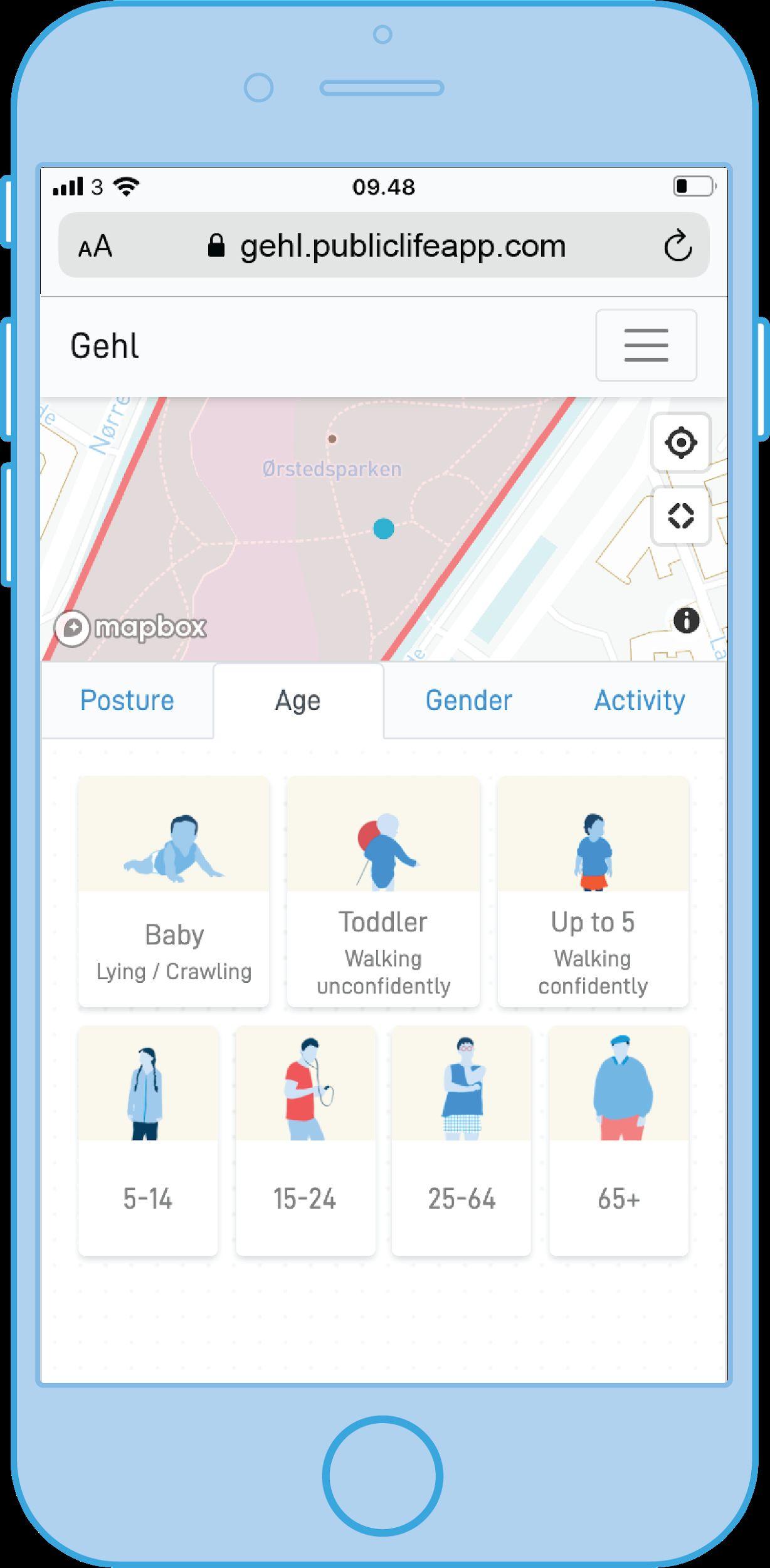
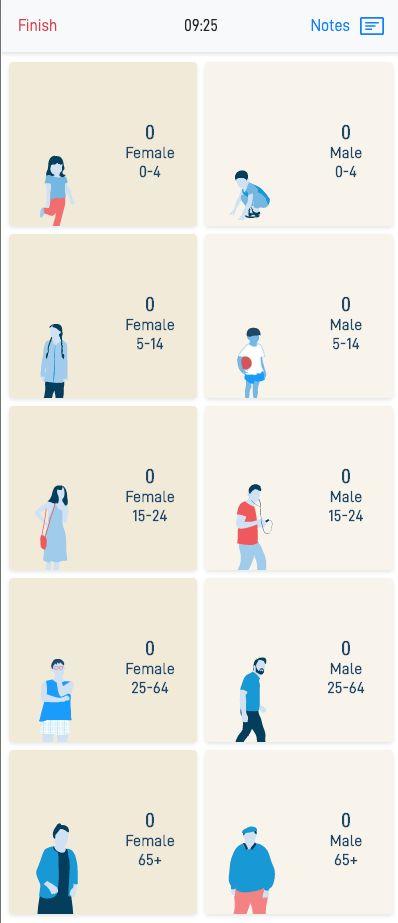

25 surveyors collected data at 5 key points in the district, with intermittent counts at Madison Square Park, on one weekday (Thursday) and one weekend day (Saturday), between 8am-8pm and 10am-10pm, respectively
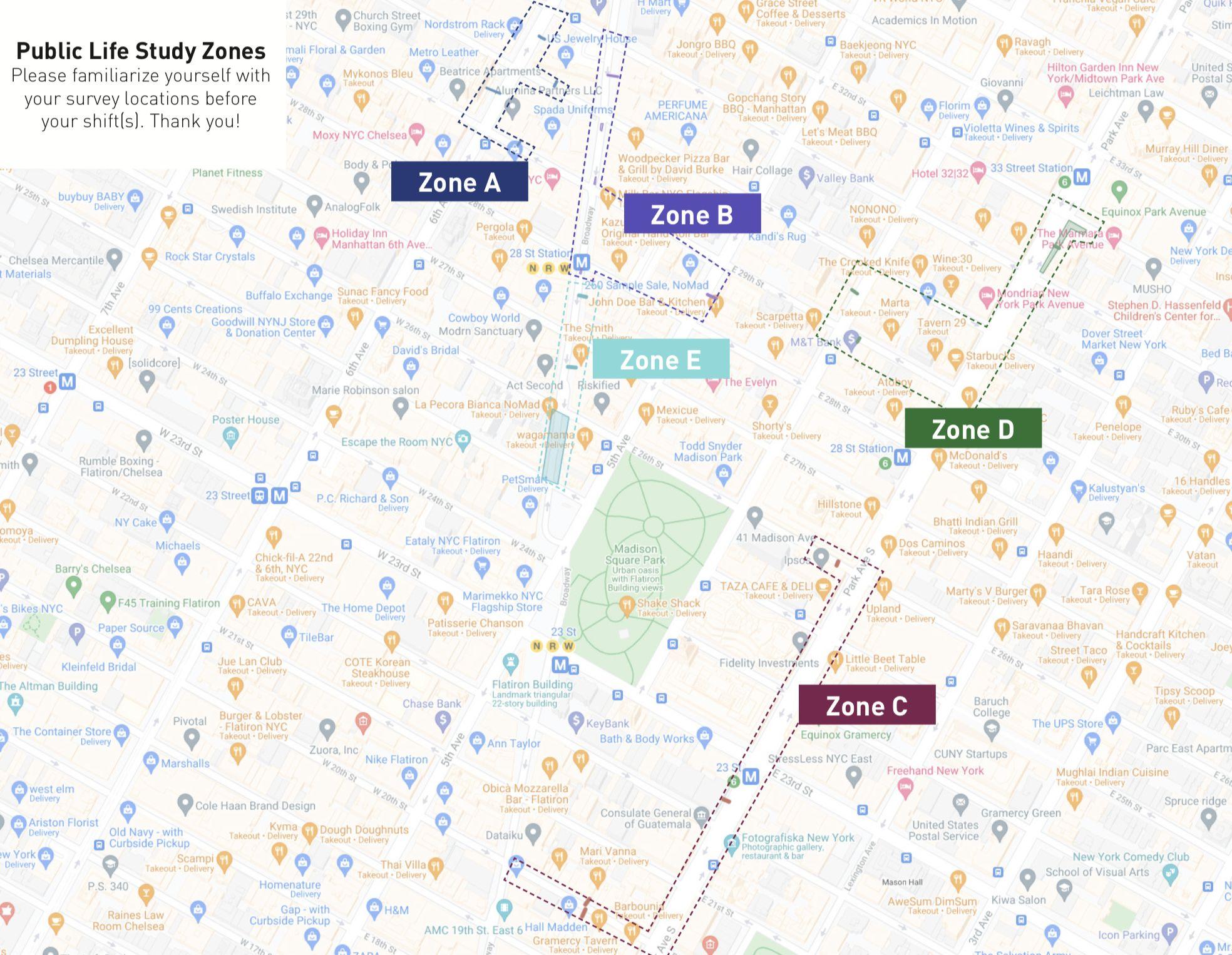



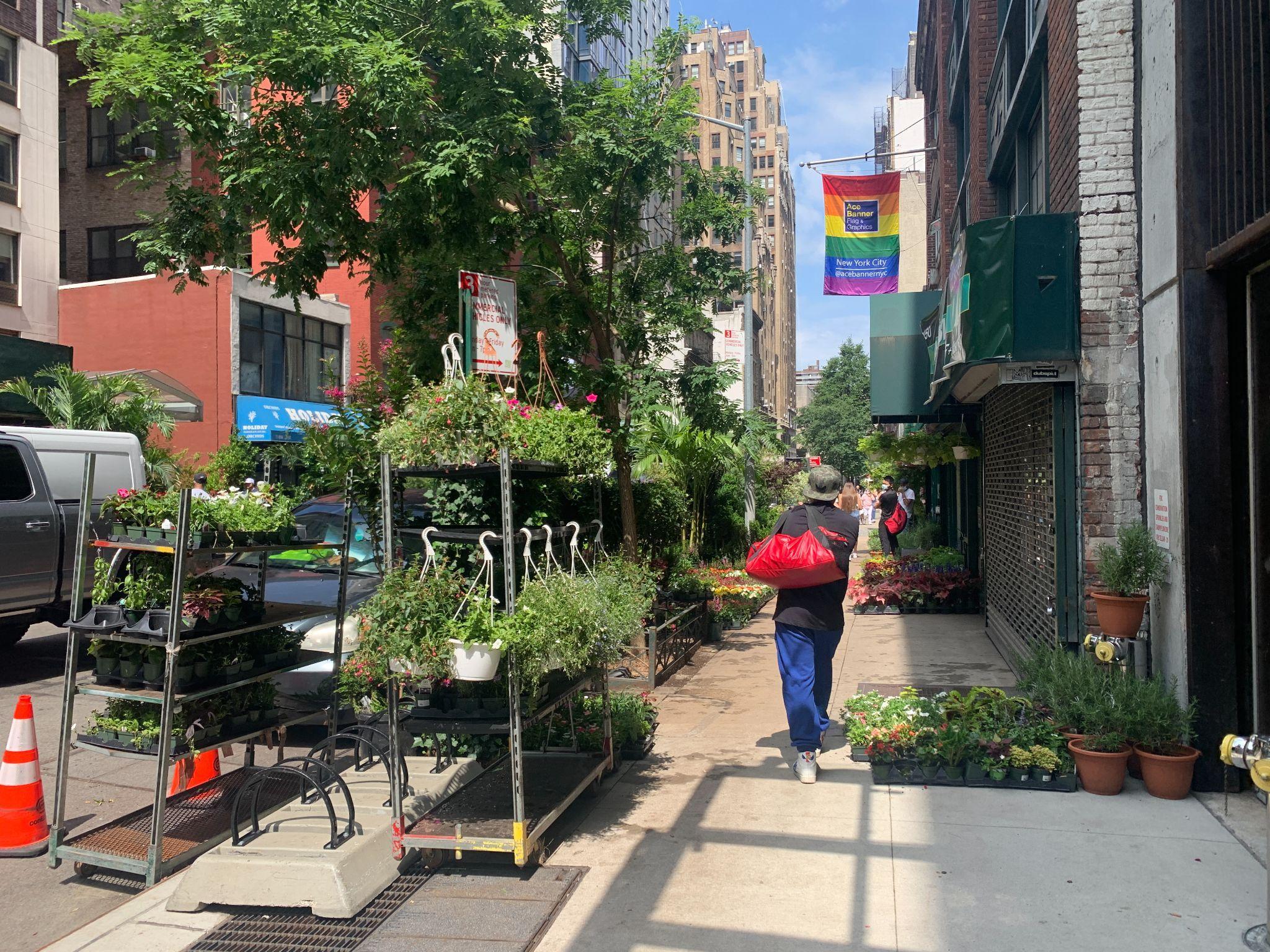
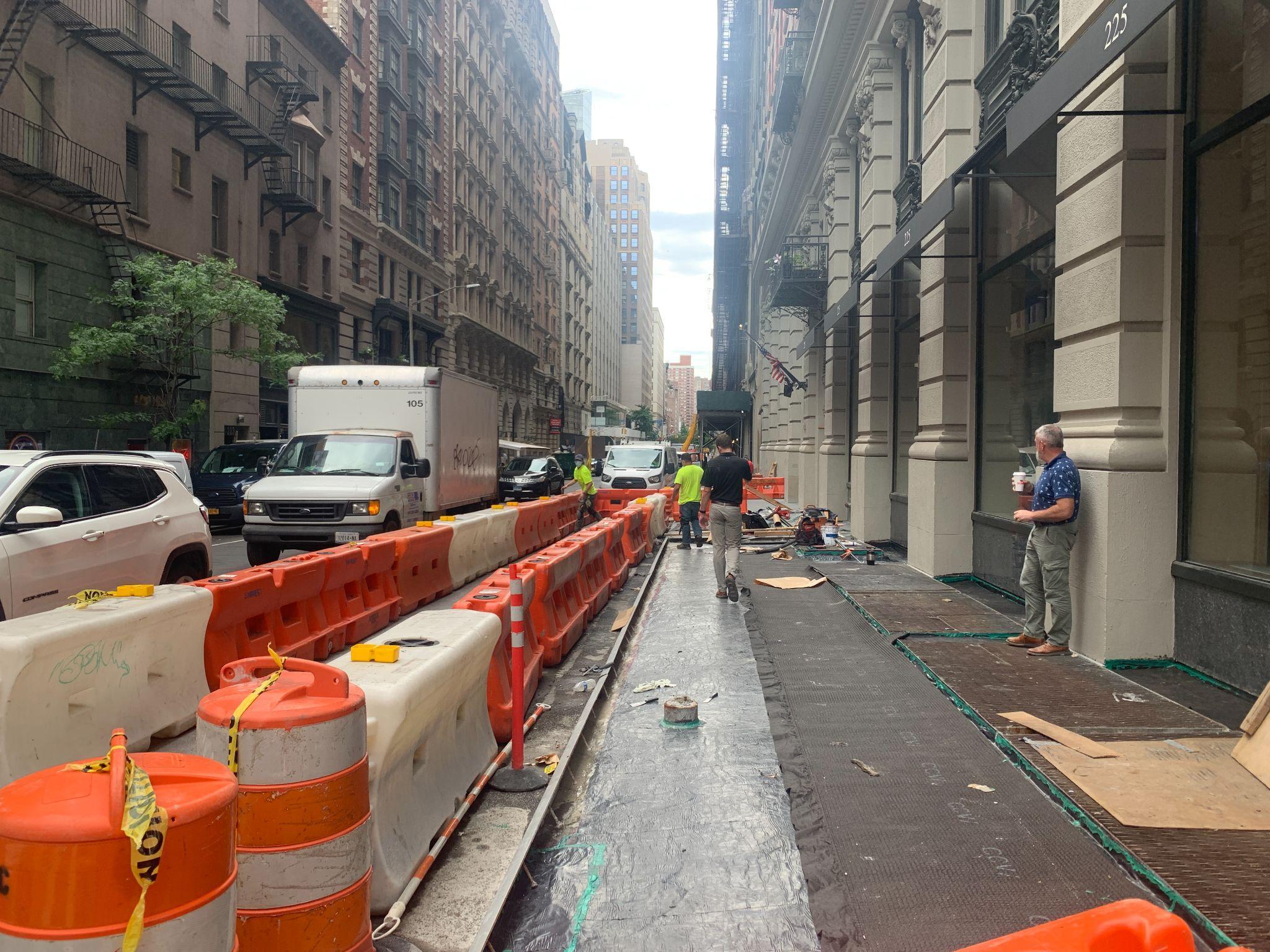
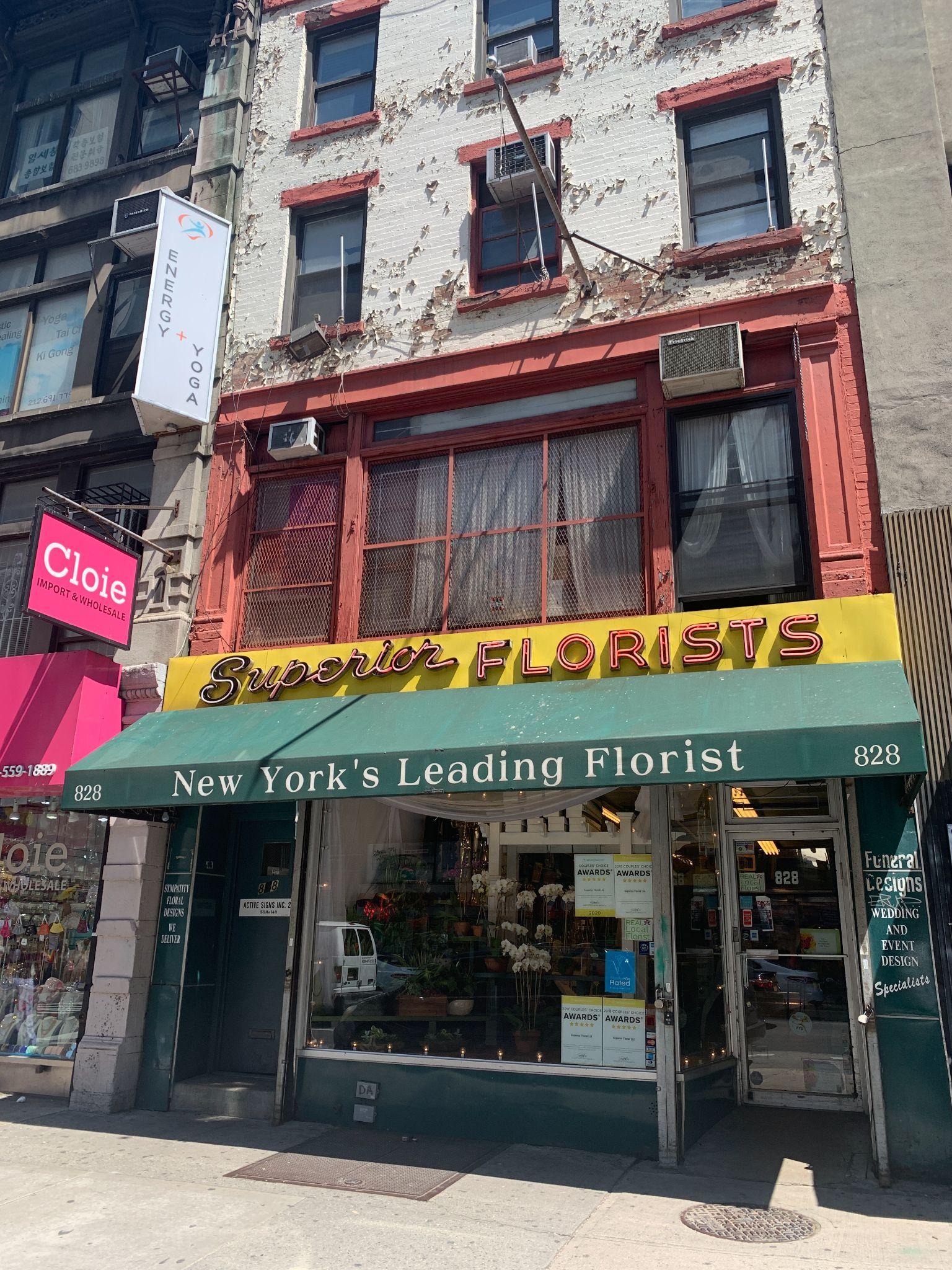
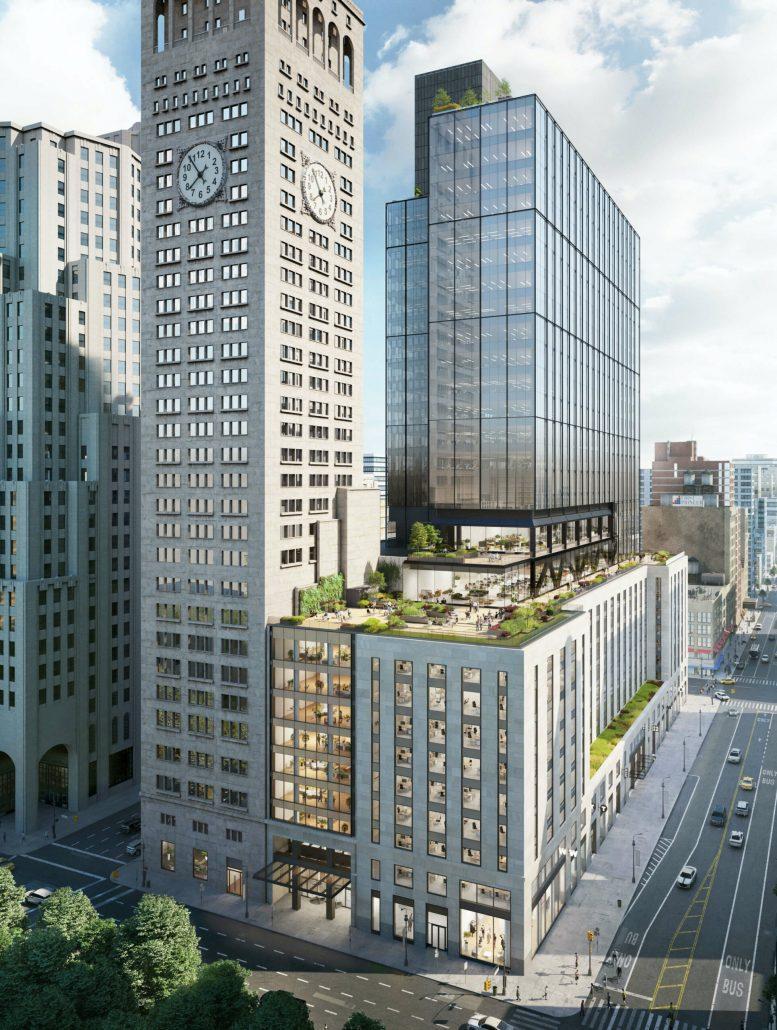



Office worker Remote worker

Very small business owner

30% of people spending time in the district are workers (Placer 2021)
Delivery workers


Construction workers


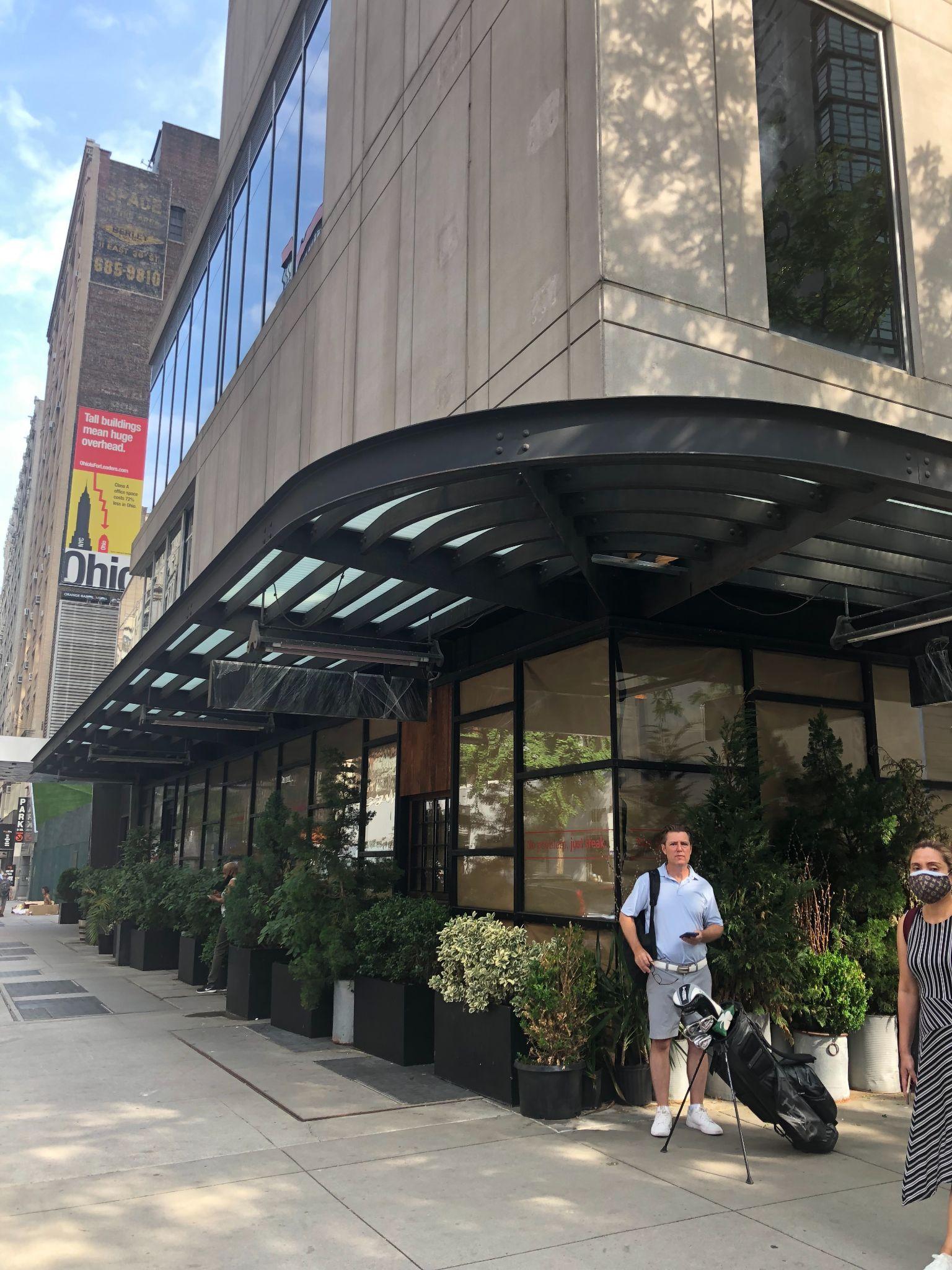
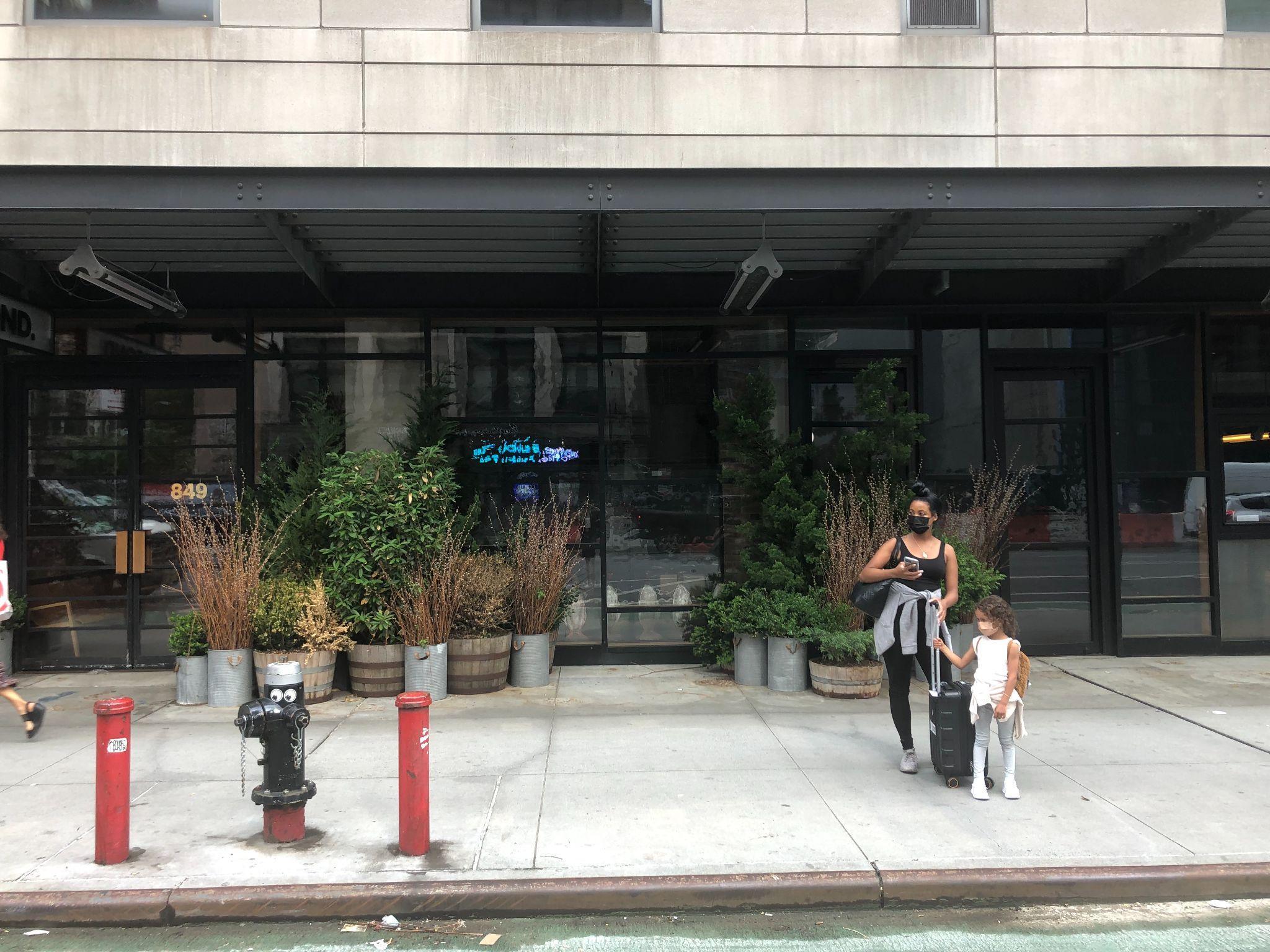
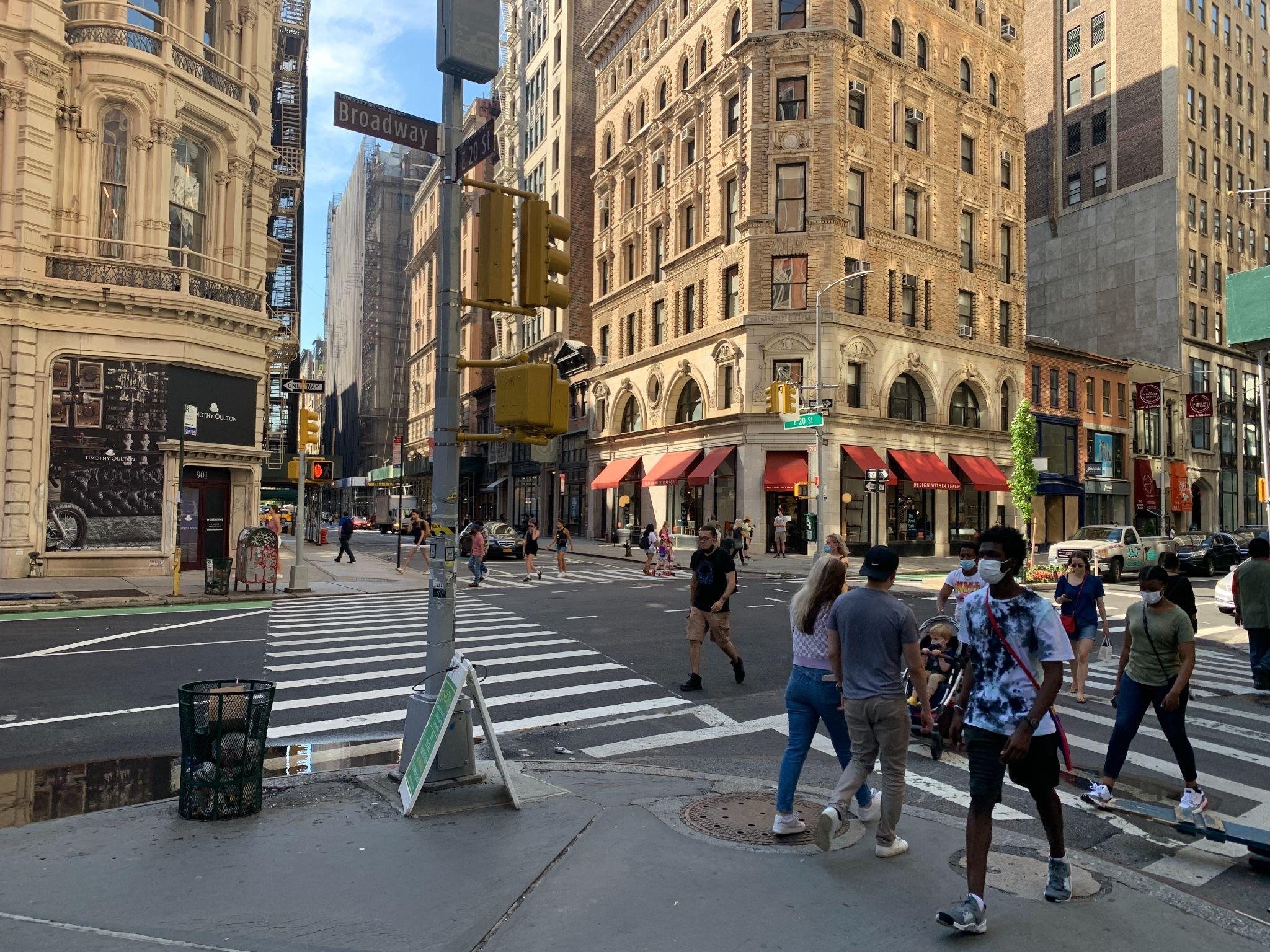

Hotel guests Business tourists
Recreational tourist
60% of Madison Square Park visitors are New Yorkers (Gehl 2015)
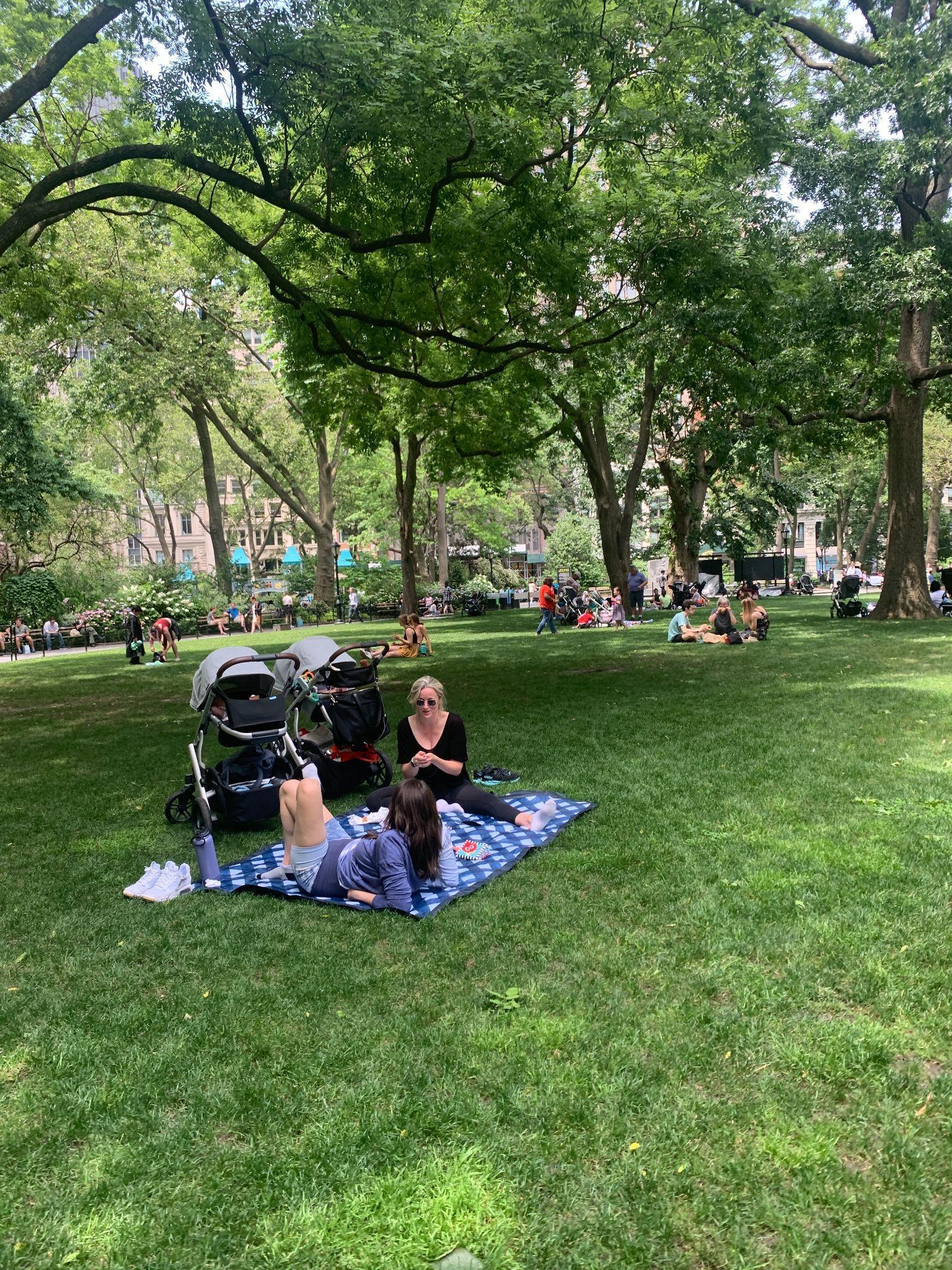
New Yorkers on the go New Yorkers stopping to stay
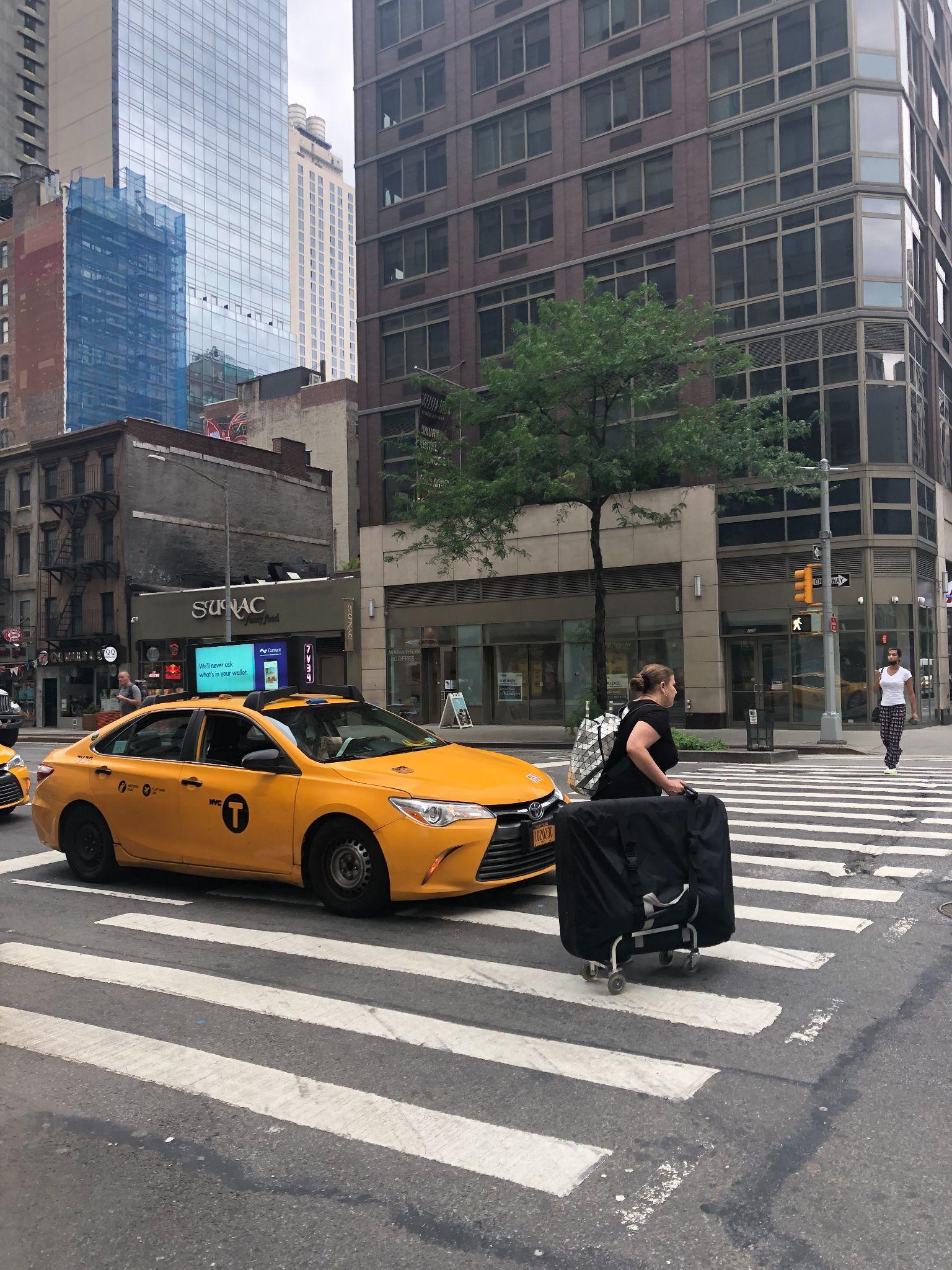
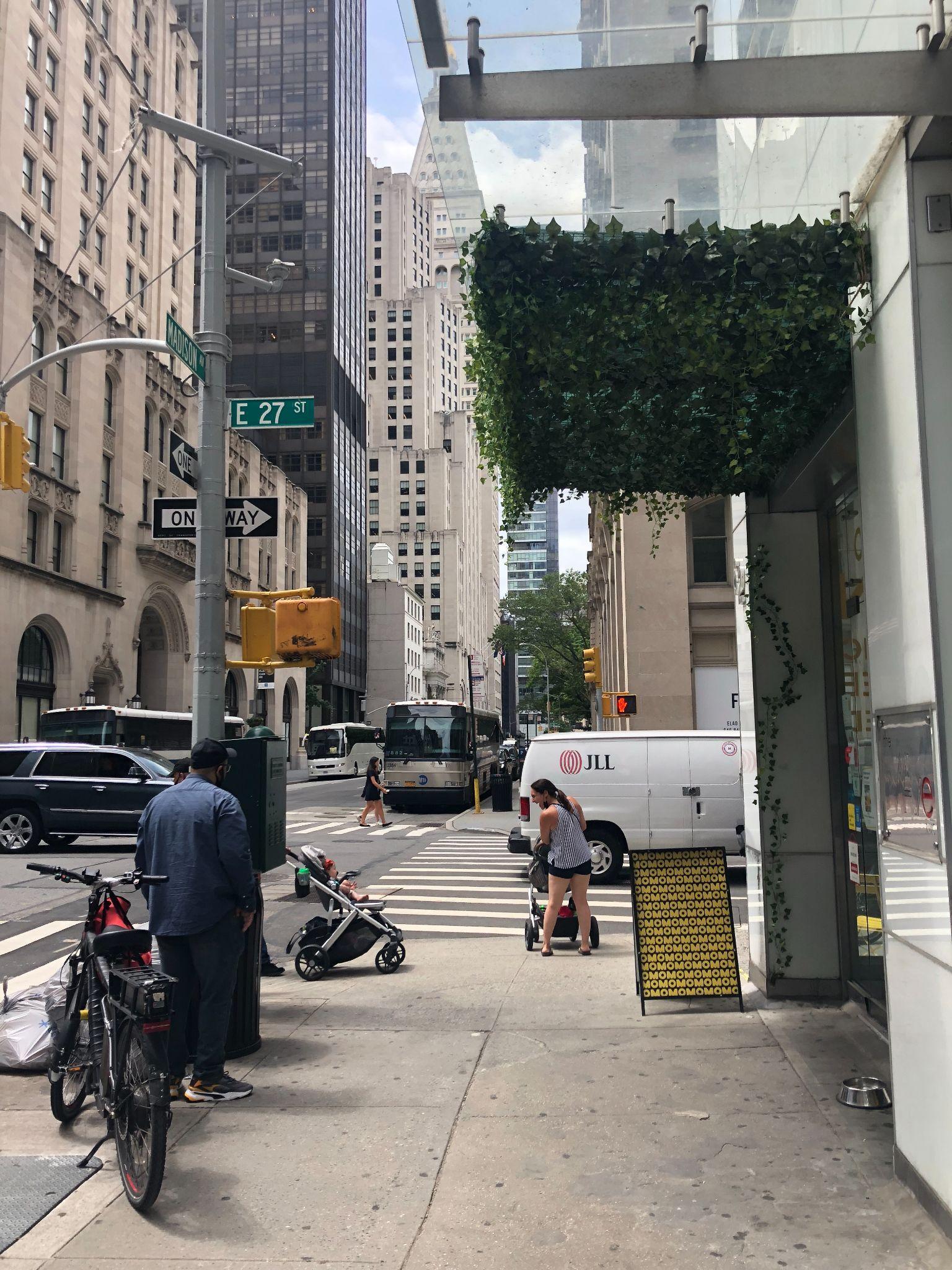


83% of people in the district are residents (Placer June 2020)
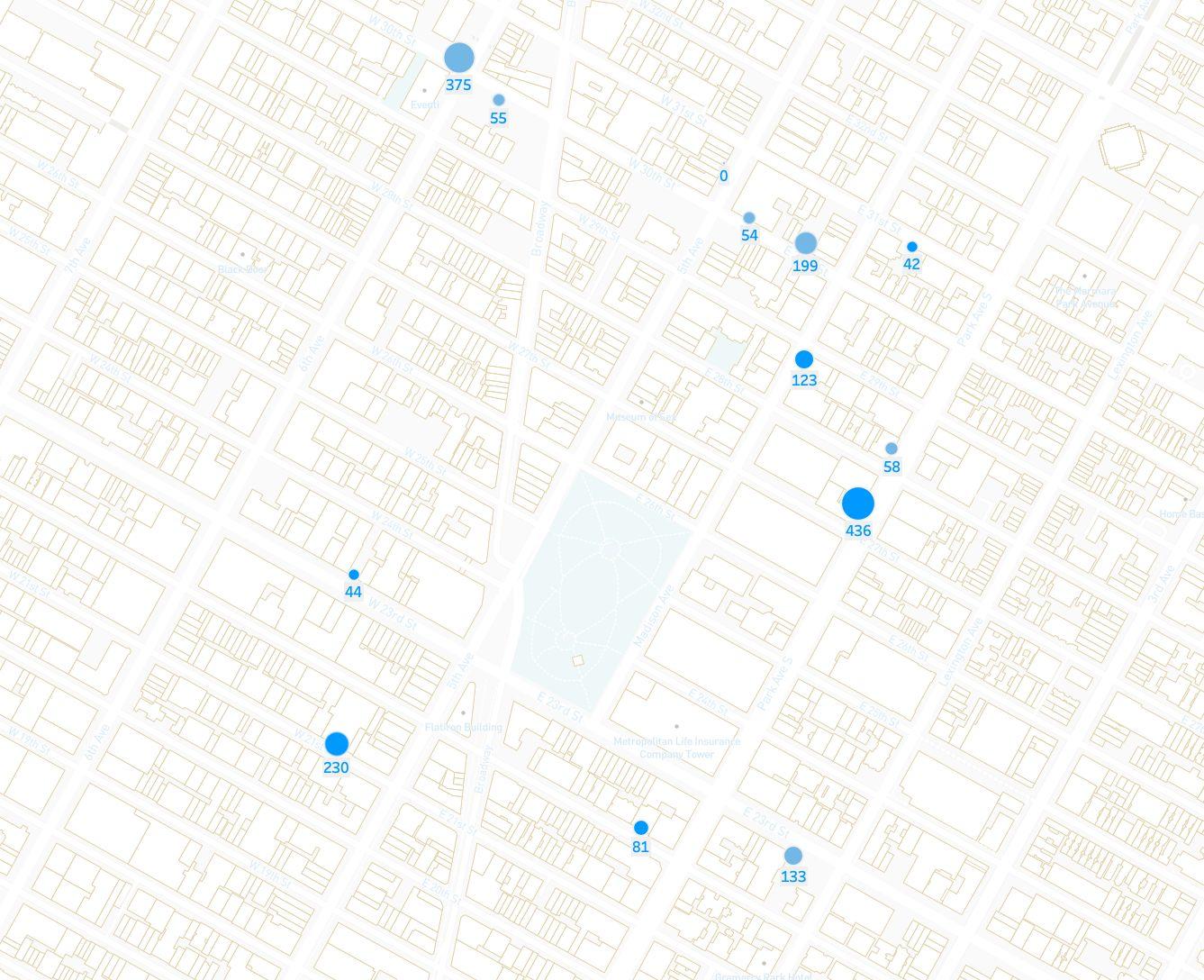
55.4% increase in families with children living in the area (2010 census to 2017 census)
1830 - Multi-family units in development or completed since 2015





You can feel that this is a neighborhood in progress! Scaffolding is everywhere, there are 13 new developments in progress, people are coming and going, from hotels, offices, transit, and stores and roadbeds are being repurposed and reimagined.
From the Broadway Plazas between 24th and 22nd streets, to ‘Dining Streets’ on Broadway between 25th-26th streets and 20th street, between Park and Broadway. The expansion area is defined by its transformation.
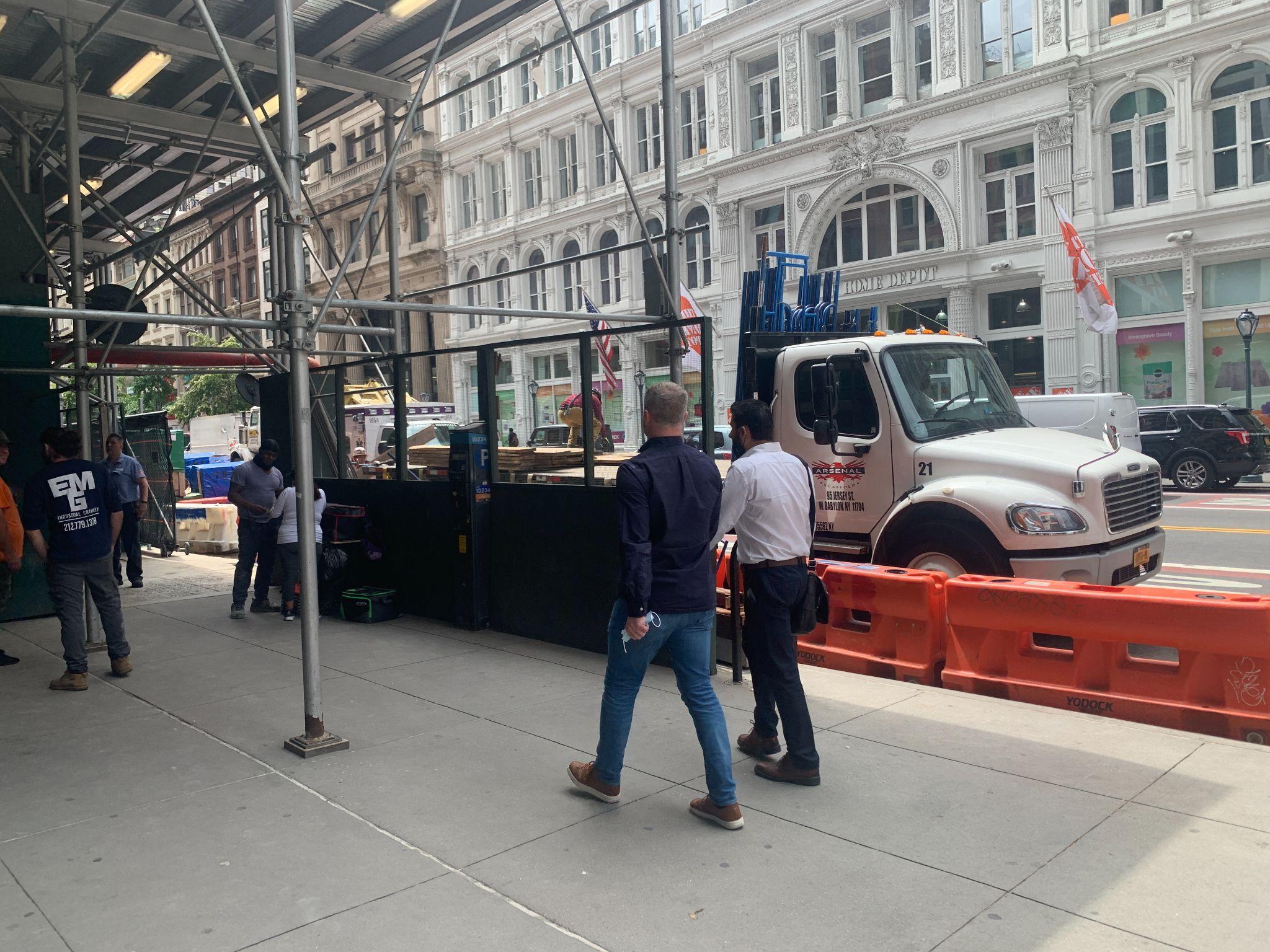



A business district that offers MORE...more historic character and quality of life offerings than FiDi, East Midtown, and Hudson Yards. This neighborhood offers a mix of prices points, from micro and luxury retail, to $1 coffees at the cart to $5 cappuccino at Ace hotel, to upscale outdoor dining to hamburgers in Madison Square Park.


A mix of residential, commercial, retail, hotel, and dining — this area has it all.
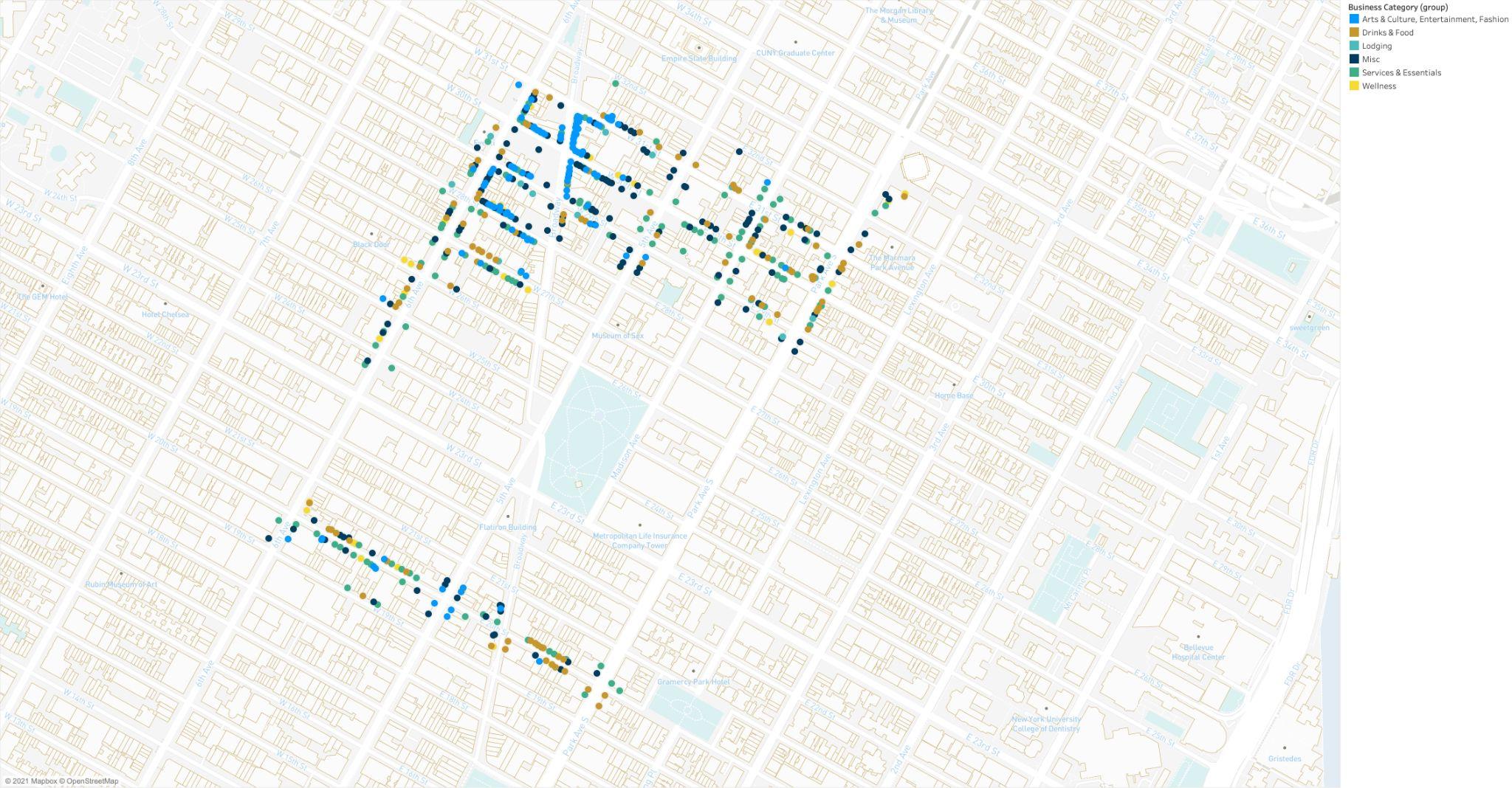

From wholesale flower businesses to trendy New York restaurants, the expansion area has a wide range of commercial offerings for visitors, workers, and residents.
Mixed use with dining & entertainment focus
Mixed uses for residents and workers


As one of the densest, most mixed use areas of NYC, with ample subway, bus and bike connections, foot traffic rivals that of major transit stations around the world.
Even with pandemic commuting numbers, the expansion area’s pedestrian and cycling volumes are close to those in world class mass transit stations.
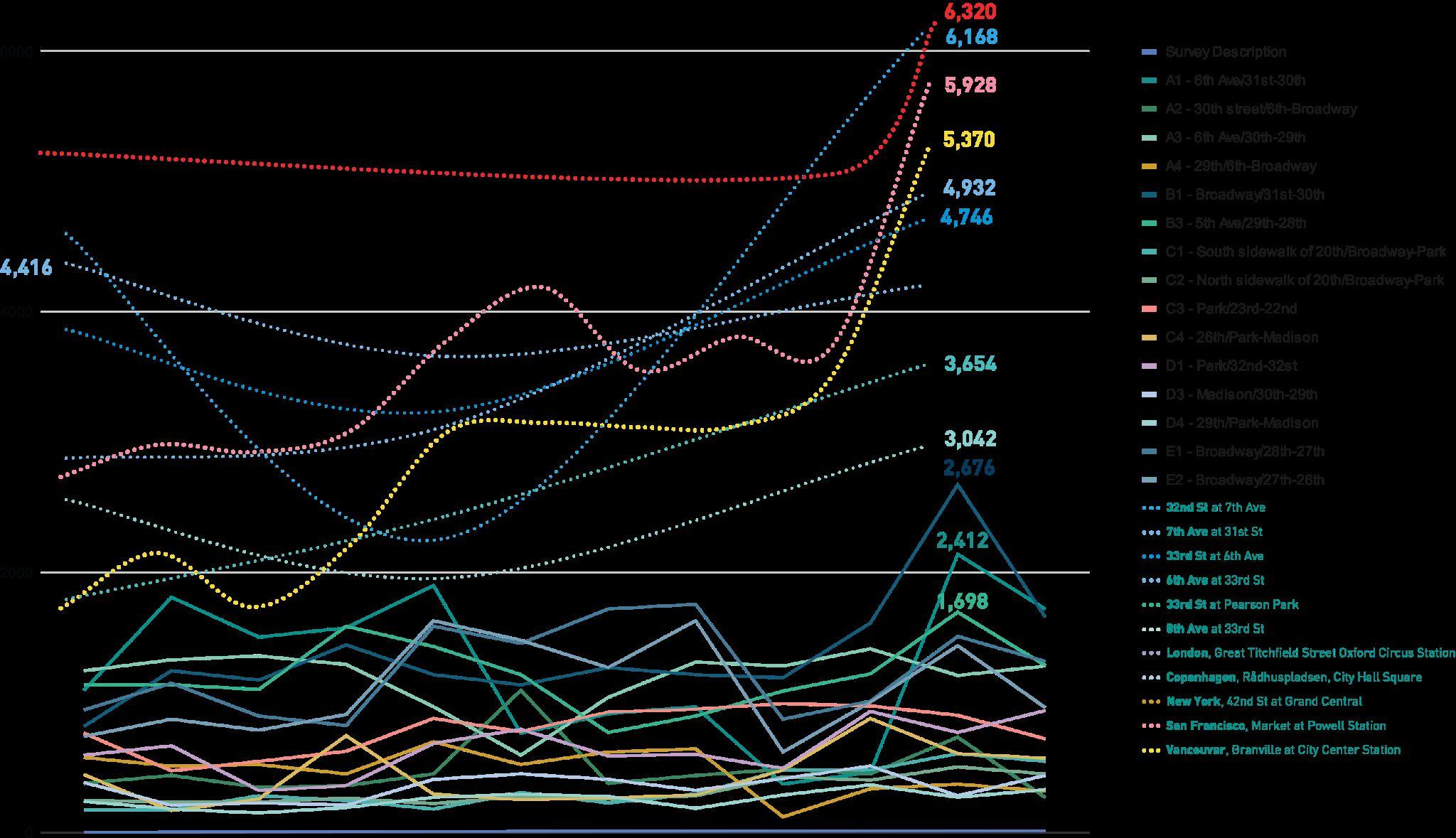


The office worker crowd is back and sticking around for weekday happy hour.
In the evenings and on the weekends, it appears fewer people choose to spend time in the area.


Saturdays
Weekday staying hinges on lunch time and happy hour - while on the weekend activity is more dispersed throughout the day.
Weekday Weekend

see more consistent stationary activity, though peak volumes are higher on the weekday.
The district sees very few young children and seniors — but a significant amount of teens and young adults.


Data is from stationary activity, weekday and weekend combined. Lack of age diversity and gender split is also reflected in the movement data.



Gender representation is mostly equal but age diversity is lacking — especially considering neighboring public spaces.
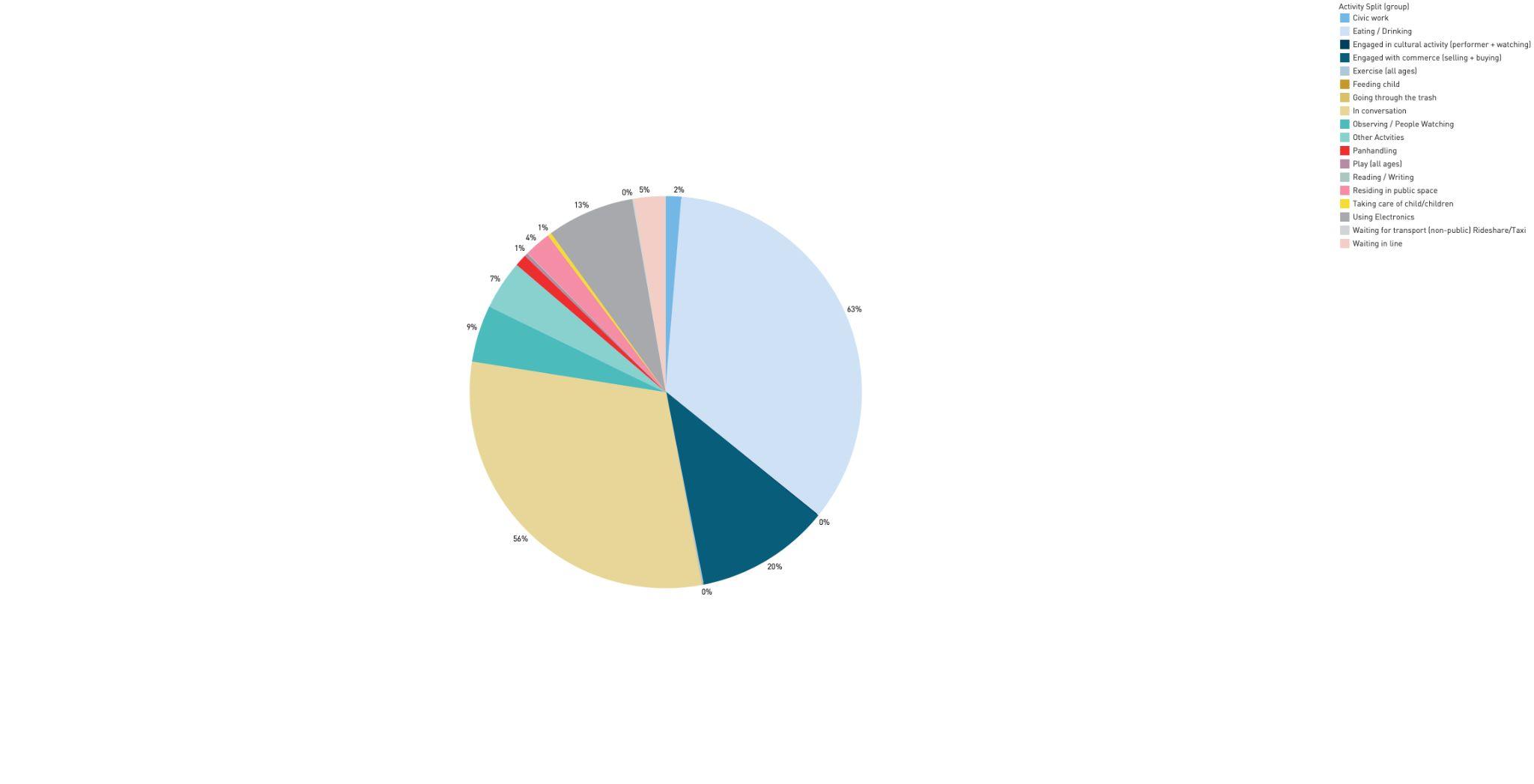


It’s all about Broadway

Broadway sees the highest movement volumes in the district.

Data is from movement counts. The first number is the total observed moving hourly, including all survey hours, both days. The number below represents the approximate hourly average. Stickiness is calculated using the ratio of people moving by people staying

It’s all about Broadway
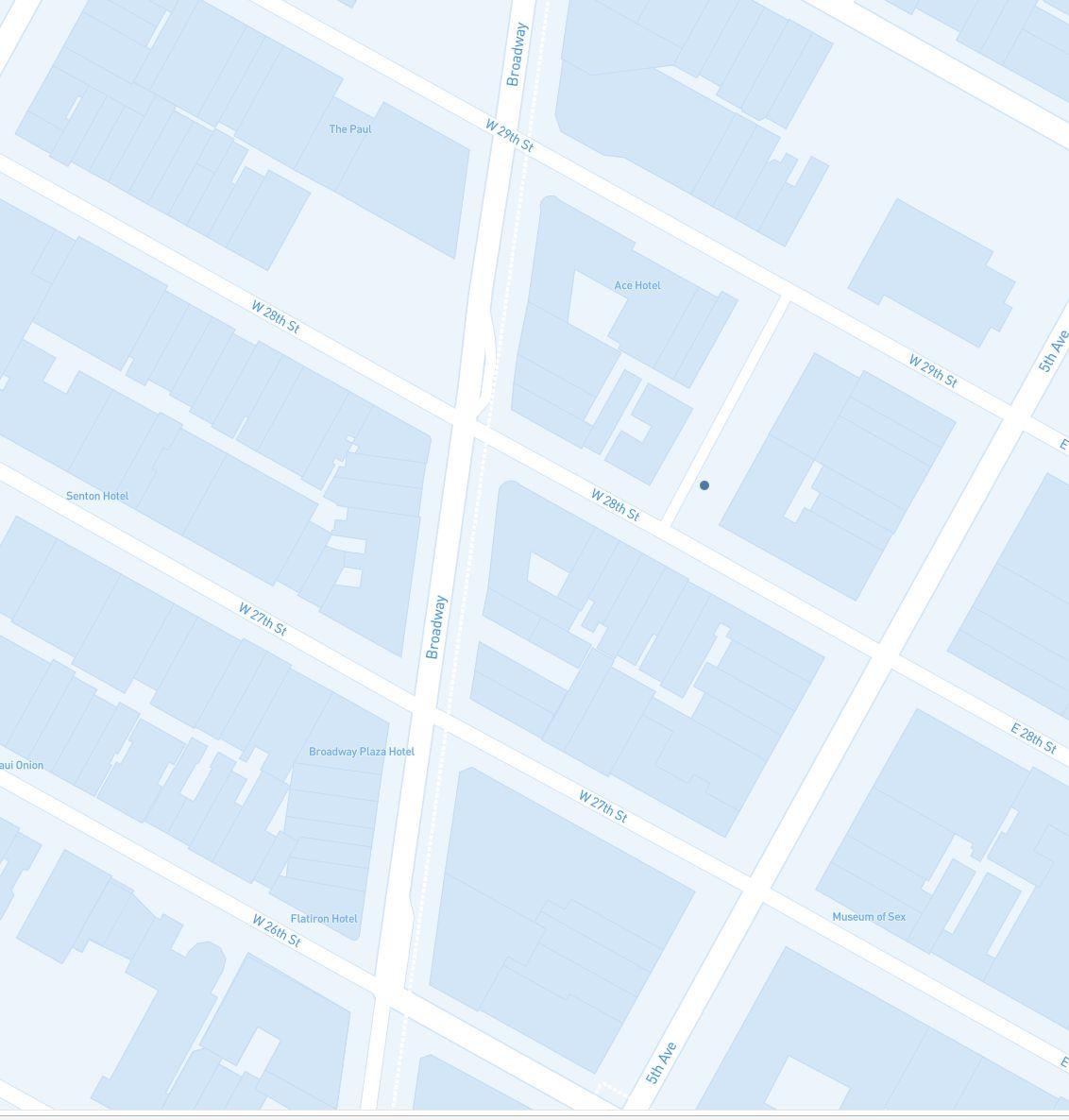
Even where there are not street closures, people are walking in the street and using Broadway as if its a space for people — not cars.

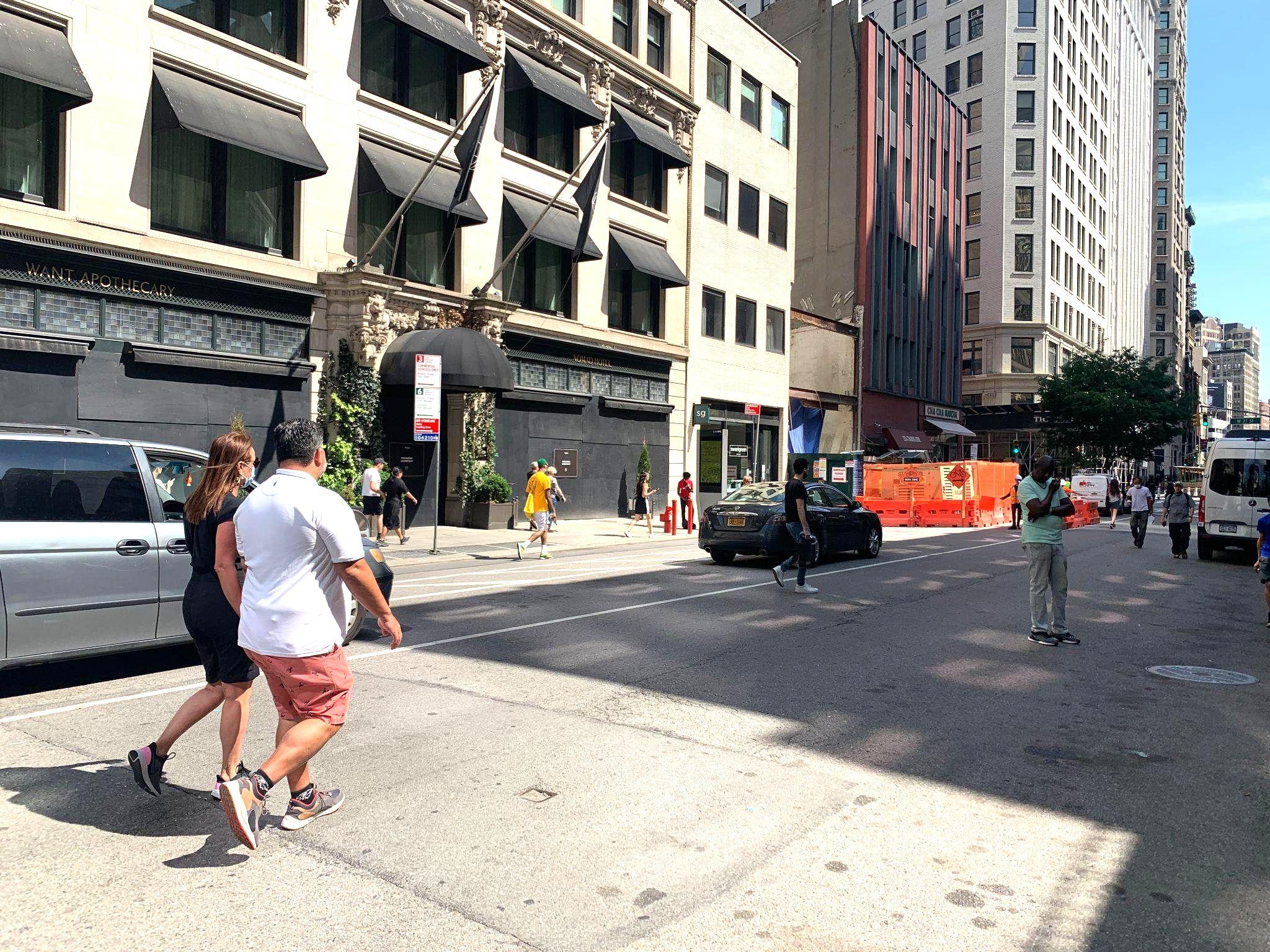

Data is from route tracing & observations throughout survey days.

It’s all about Broadway

People are desperate for a seat. If we remove the outdoor dining block from the analysis — almost everyone is standing or sitting informally.

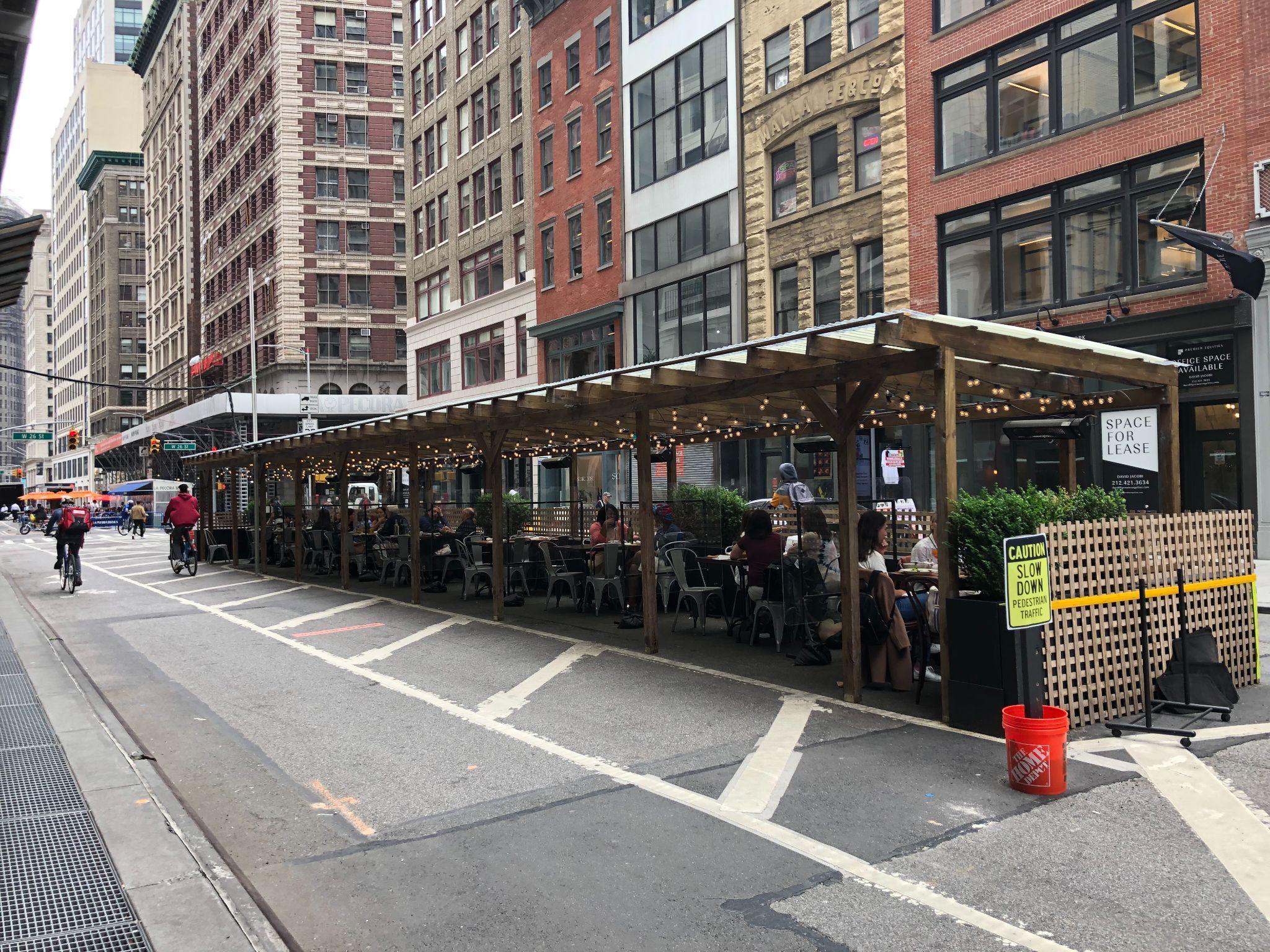
24% Standing

6% Informal Sitting
1% Lying
93% are standing or sitting informally on upper Broadway

69% Commercial Sitting
Data is from stationary activity & observations
Sitting commercial
It’s all about Broadway
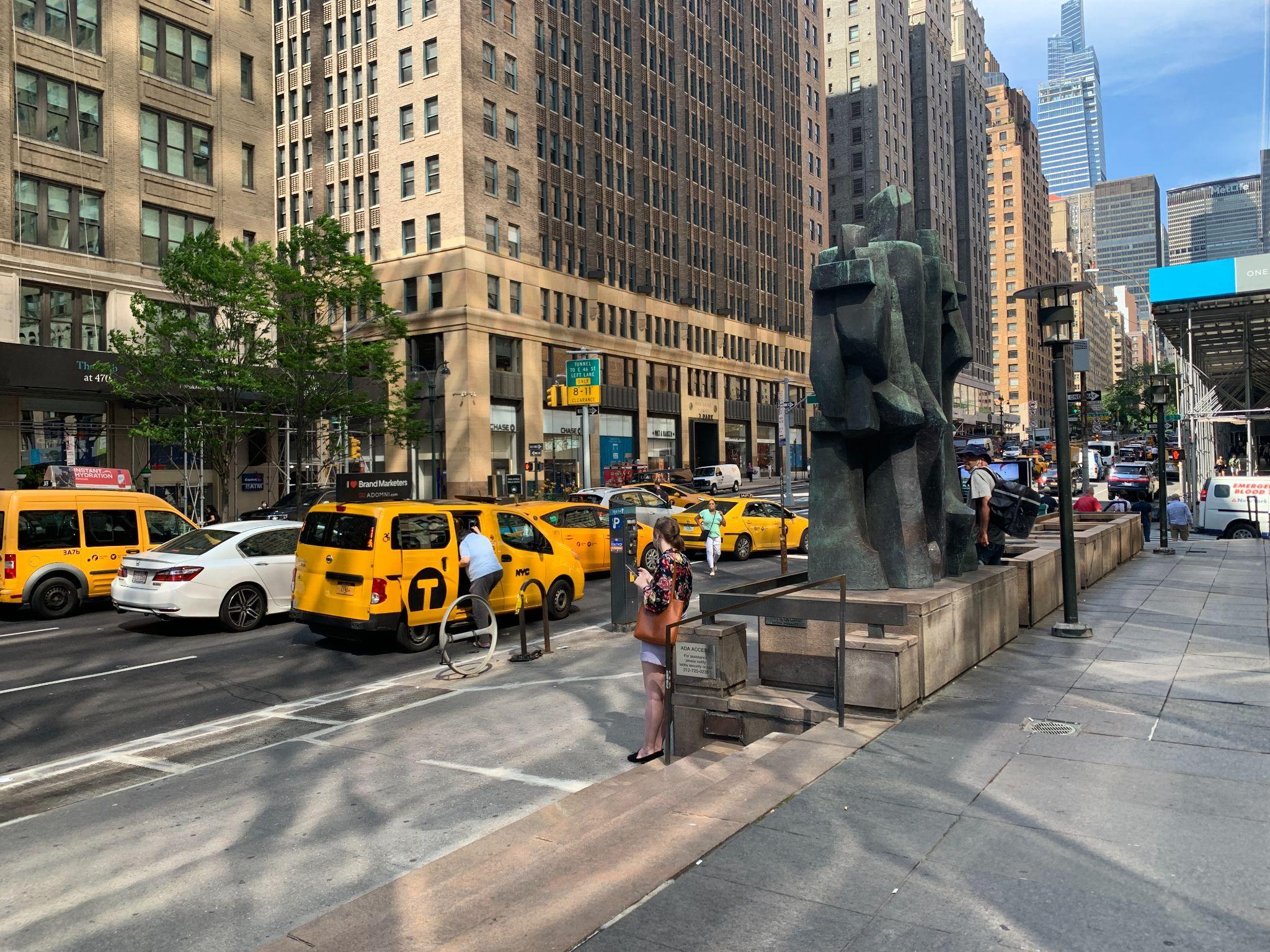


The data from Park, Madison, Fifth, and 6th prove that people mostly have to be there for work, to enter a hotel, or to commute.
Data is from movement counts. The first number is the total observed moving hourly, including all survey hours, both days. The number below represents the approximate hourly average. Stickiness is calculated using the ratio of people moving by people staying

People respond well to environments that consider our human-scale

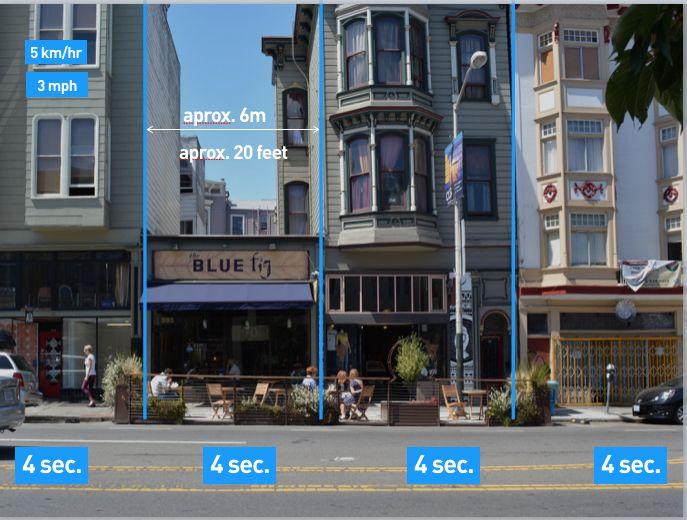

It’s all about Broadway
People won’t spend time in places where they don’t feel comfortable
1 in 72 stay — Park & 31st

4 sec
Vacant facade
4 sec
Set back & not active No formal seating invite
4 sec

It’s all about Broadway
The stimulating ground floor environment of Broadway makes the street a more inviting place to walk
1 in 32 stop & stay — Broadway & 31st-28th
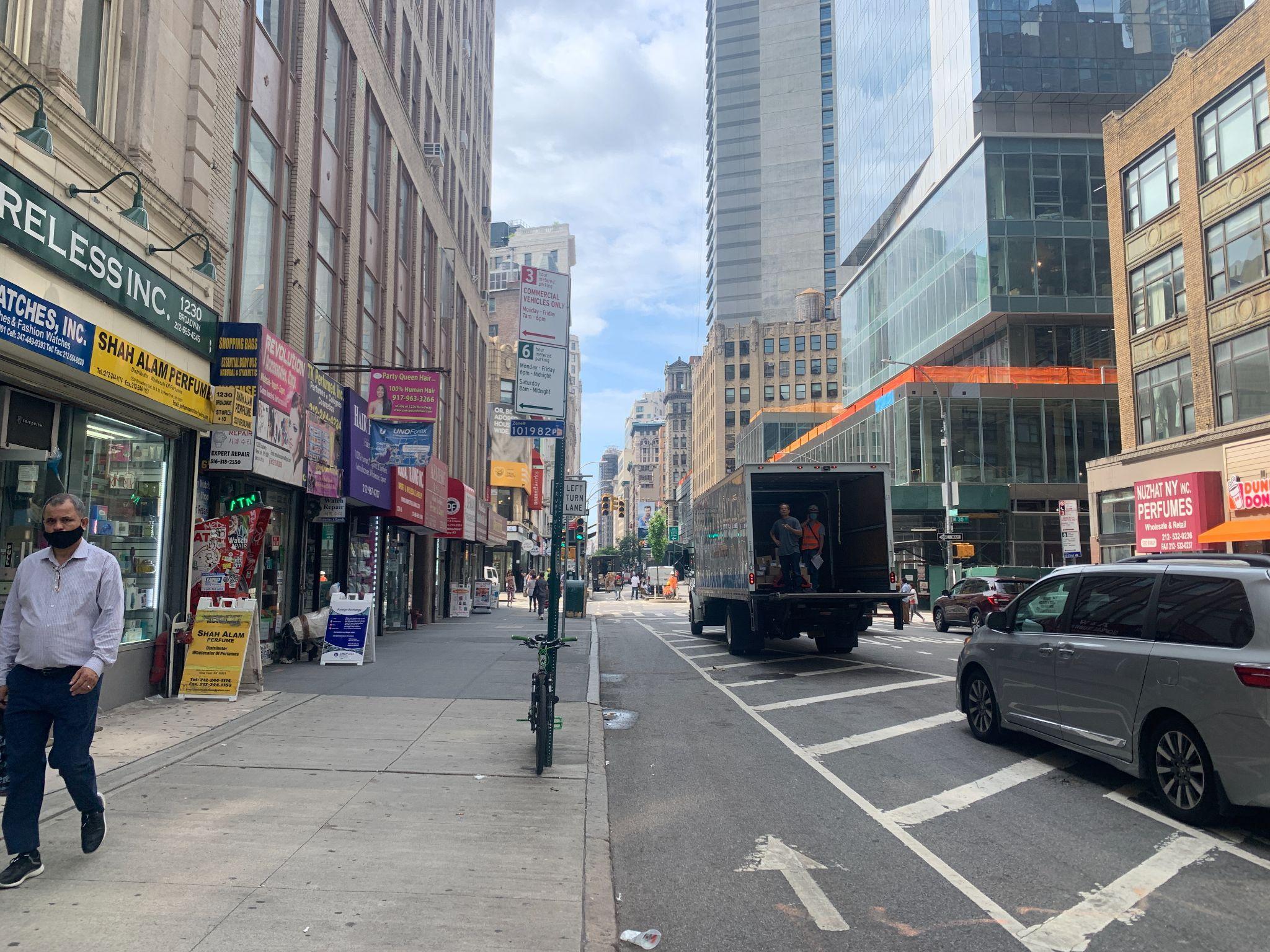
**peak hour 3pm


Micromobility is here

The highest rates of biking were found on a street with a bike lane, 29th Street (34%) compared to the second highest (26%) which was also on 29th tied with 6th Avenue (26%)

Across both days, 17% of human powered mobility was on wheels
29th sees the most bike/wheel traffic 34%
Data is from movement counts. Thursday is shown on the left and Saturday is on the right side of the graph.
Micromobility is here
Personal Bike
Citibikes, e-bikes/delivery bikes, and personal bikes are the preferred wheels to get around.


Delivery cyclists are not just prominent in movement patterns. We also observed them staying and waiting for fare.
Scooter/ Skateboard
Citibikes are the preferred way to get around on wheels

Data is from movement counts, both days.
EBike/Delivery

CitiBike
Followed by deliver workers - 27%






So many people on or with wheels, yet so few places to leave your ride — safely!


Commuters are competing against cars, sanding in the intersection waiting to cross the street, weaving through cars, and watching for trucks — even in bike lanes!





Delivery cyclists wait on streets and sidewalks for their next job, while other vendors rest on their handtrucks between shifts.





The instant-delivery culture amplified by the pandemic is present









The PSPL counts bike and foot traffic but we know there are many others commuting in and out of the district.


















Activity offer is narrow
Weekdays are for the office worker and weekends cater to tourist traffic
The expansion area has an opportunity to fill gaps in the public life daily rhythm.
Commuting and happy hour peak on Broadway & 31stheaded to and from the subway
More consistent mid-day activity on Broadway. Likely tourists or locals being tourists in their city
Data is from movement counts.
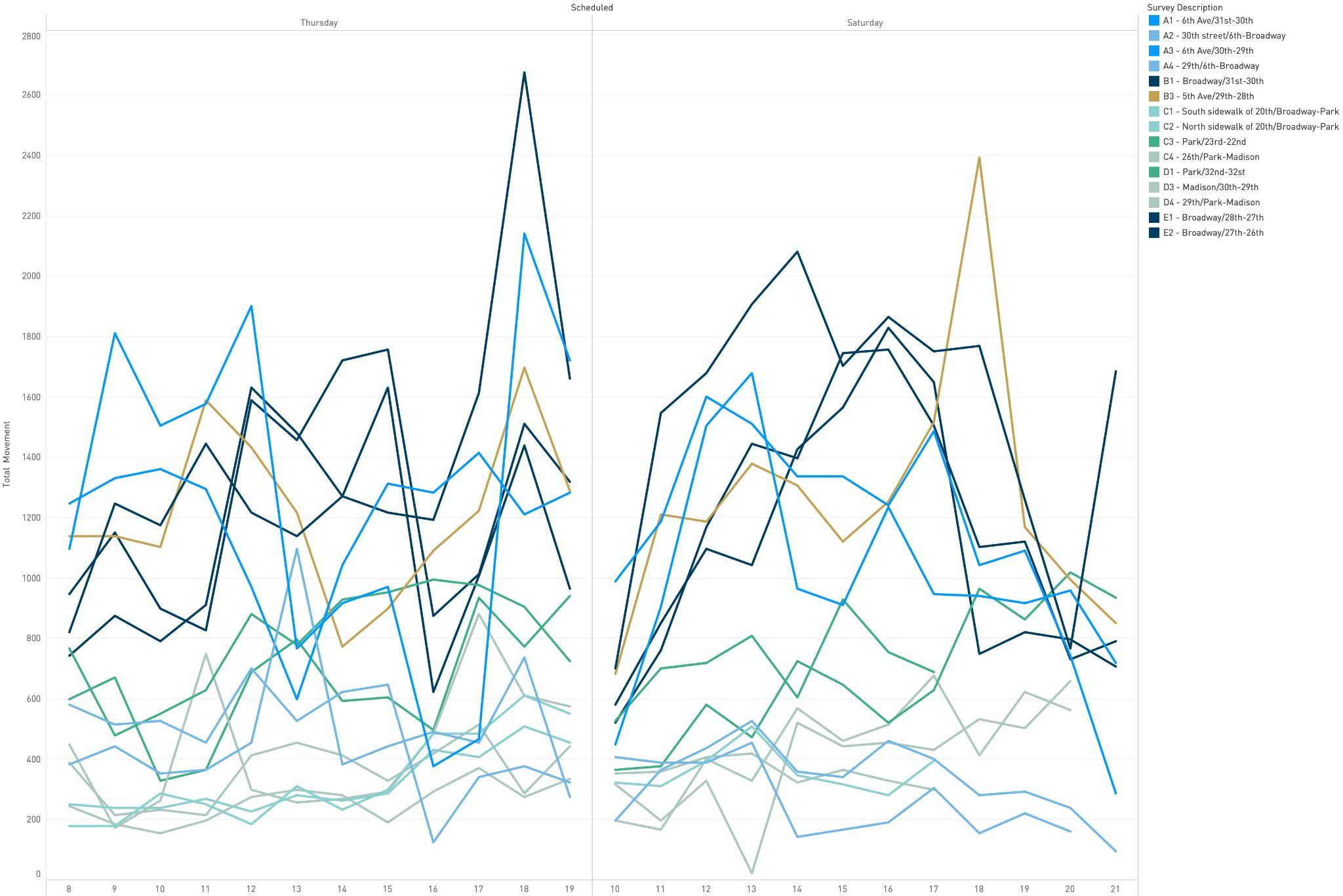
Morning commutes on 6th Ave Lunch time peak!
Peak stationary on Saturday.A little nightlife
PSPL Survey Locations
Activity offer is narrow
The districts activity mix is hinged on outdoor dining, but there is a latent desire for a wider variety of activities.
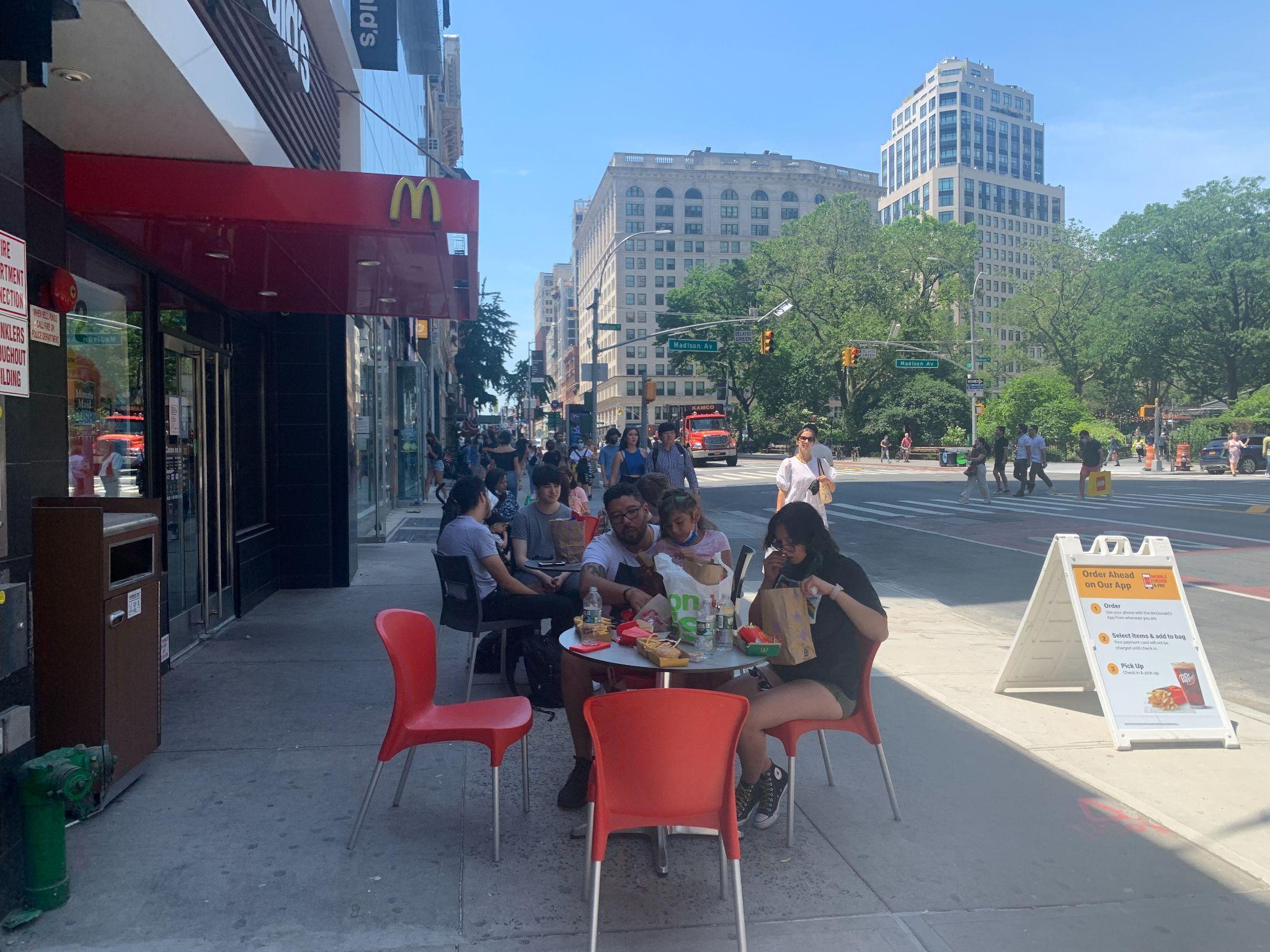
Madison Square Park Snapshot
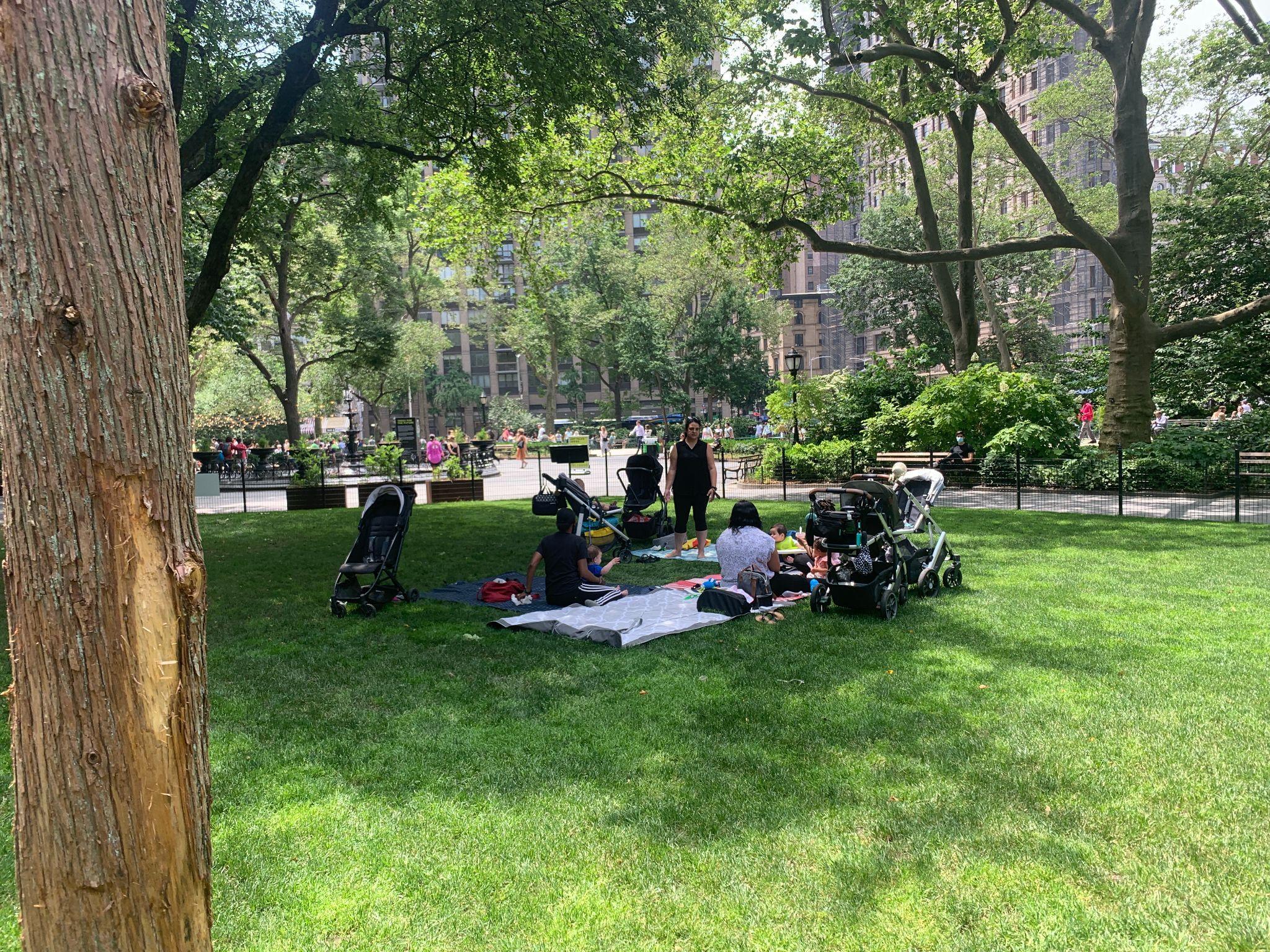
Few activities dominate & are mostly related to outdoor dining


Diverse activity offer—taking care of children, play, work

Activity offer is narrow
All within a quick walk or bike ride
The District is within walking distance of so many New York neighborhoods and attractions but there is no wayfinding or signage to direct you or communicate proximity.


Flatiron is a launch pad to so many New York gems. But it’s hard to know that on the ground.
Is this New York City?

52% of people spending time in the district are visitors (Placer 2020)
Where do I go from here?

47% Standing
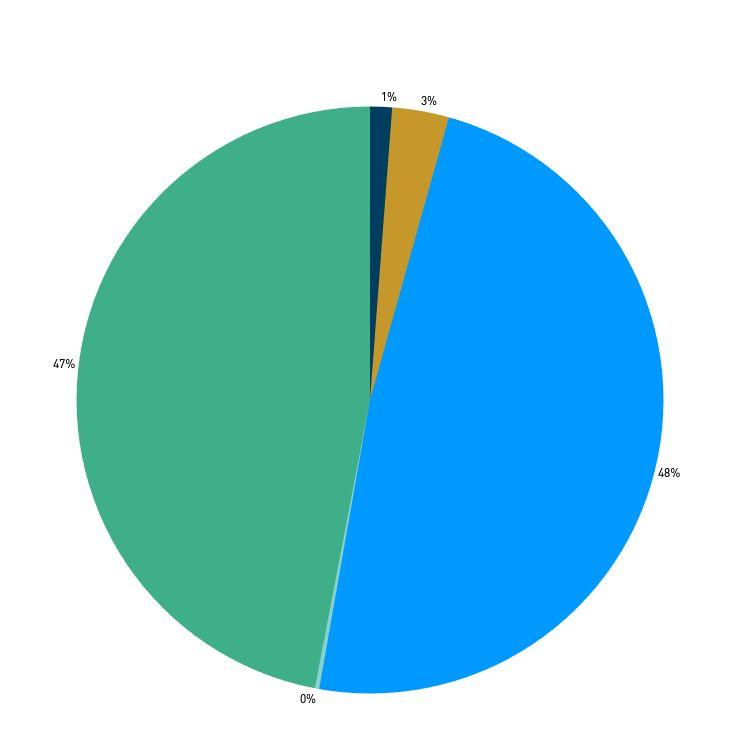
48% Informal Sitting

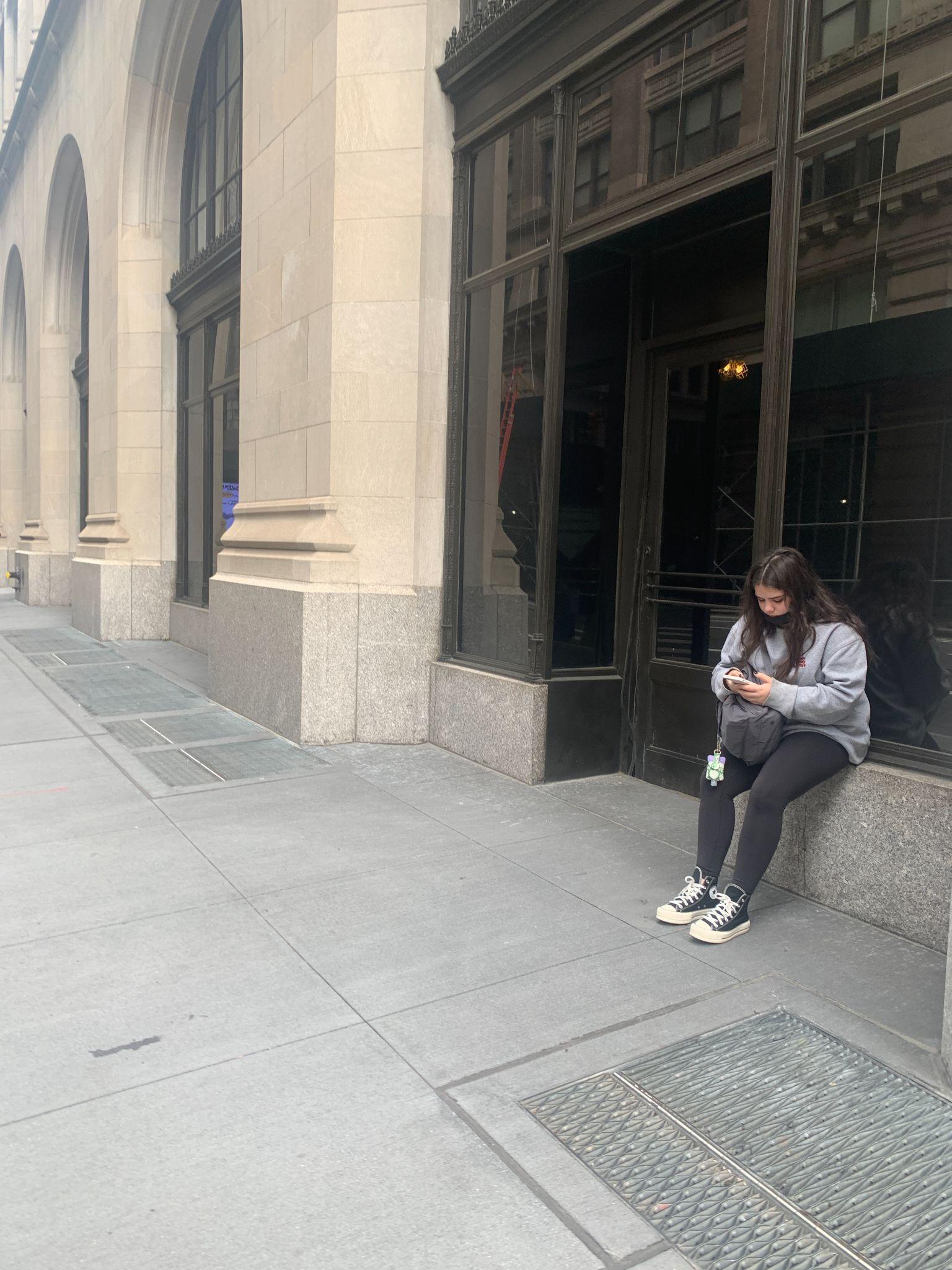
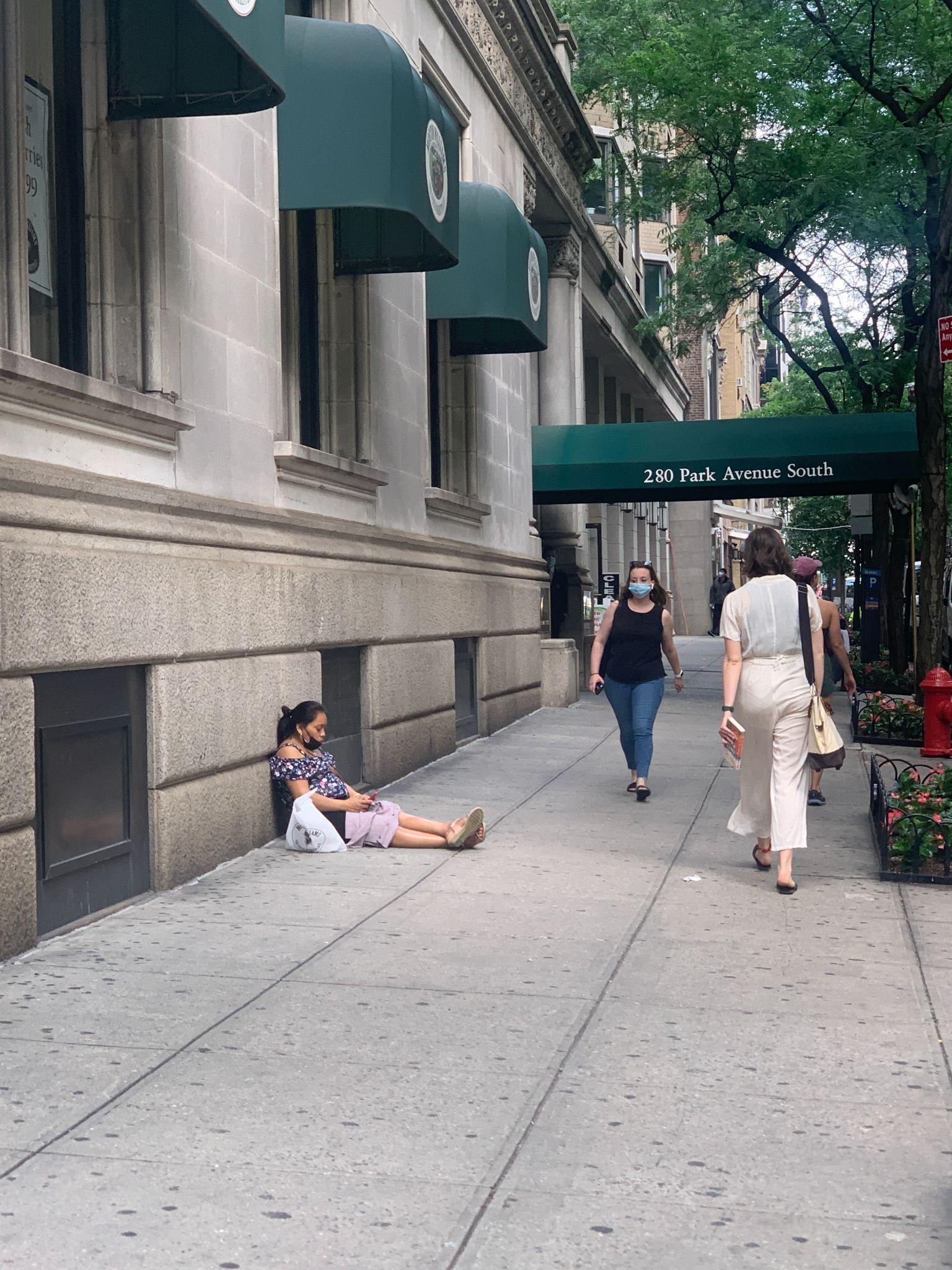


Saturday Night, 8pm
Safety and comfort need a boost
Eyes on the street aren’t everything but they certainly help. Number of people spending time and in particular, the presence of women at night can be an indicator of safety.
While Flatiron Partnership survey respondents indicate they feel safe, supplementing surveys with an eye level understanding helps to paint a more complete picture
People get out of doge on Saturday nights!

Broadway & 25th

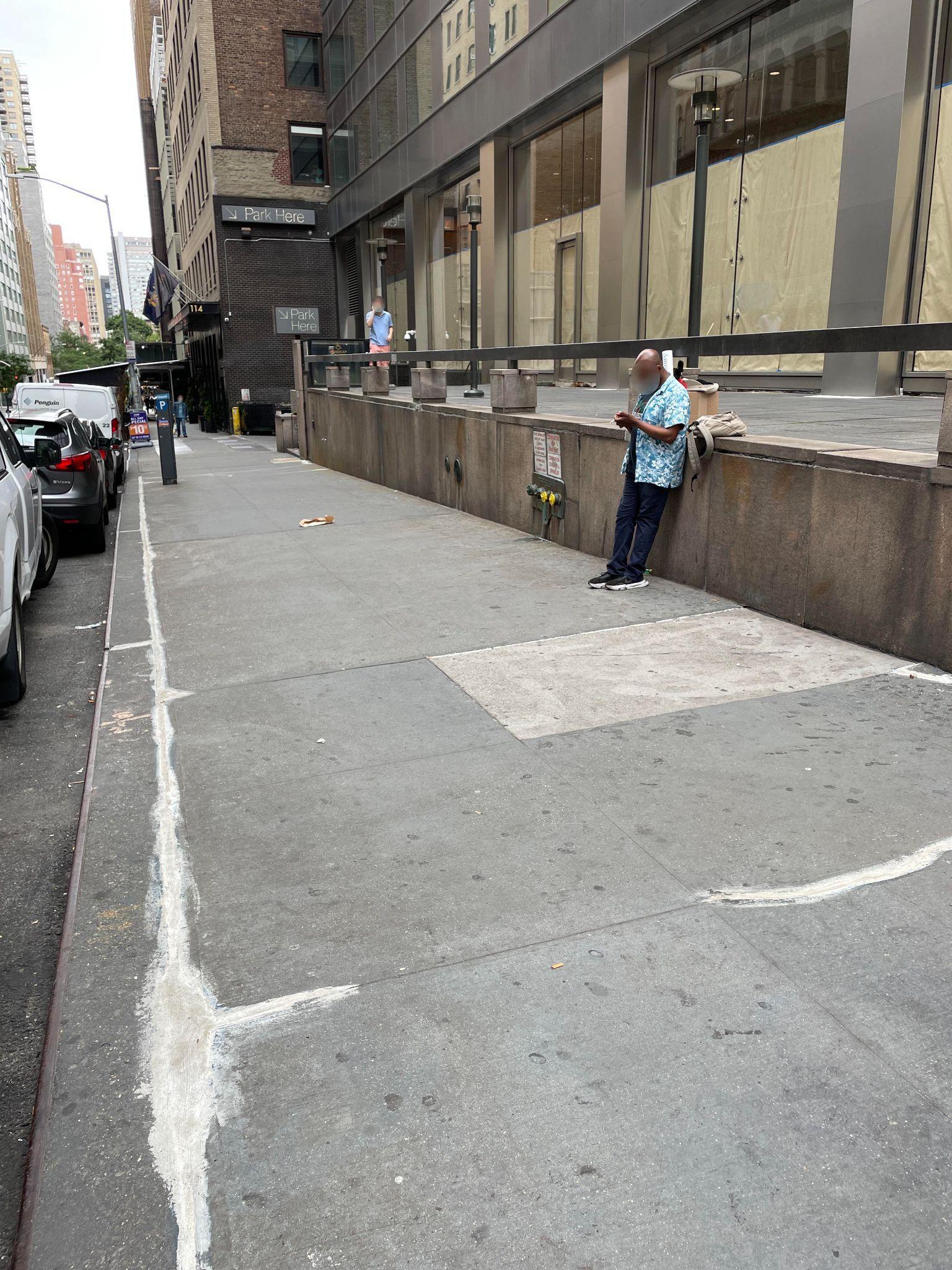
62% Female

This feels safer...
Park & 31st
20% Female
...than this






Public seating, shade, traffic calming, greenery, and lighting are essential
Continue to celebrate Broadway as a place for people & move the needle on eliminating cars from Broadway.
A true mix of tourists, workers, residents, and local tourists — the expansion area should offer something for everyone
Flatiron is a commuting hotspot & leading the way with new mobility in New York. Be innovative in providing for New Yorkers on wheels.
Local businesses bring urban quality and New York character to the area (but also help people know where they are)
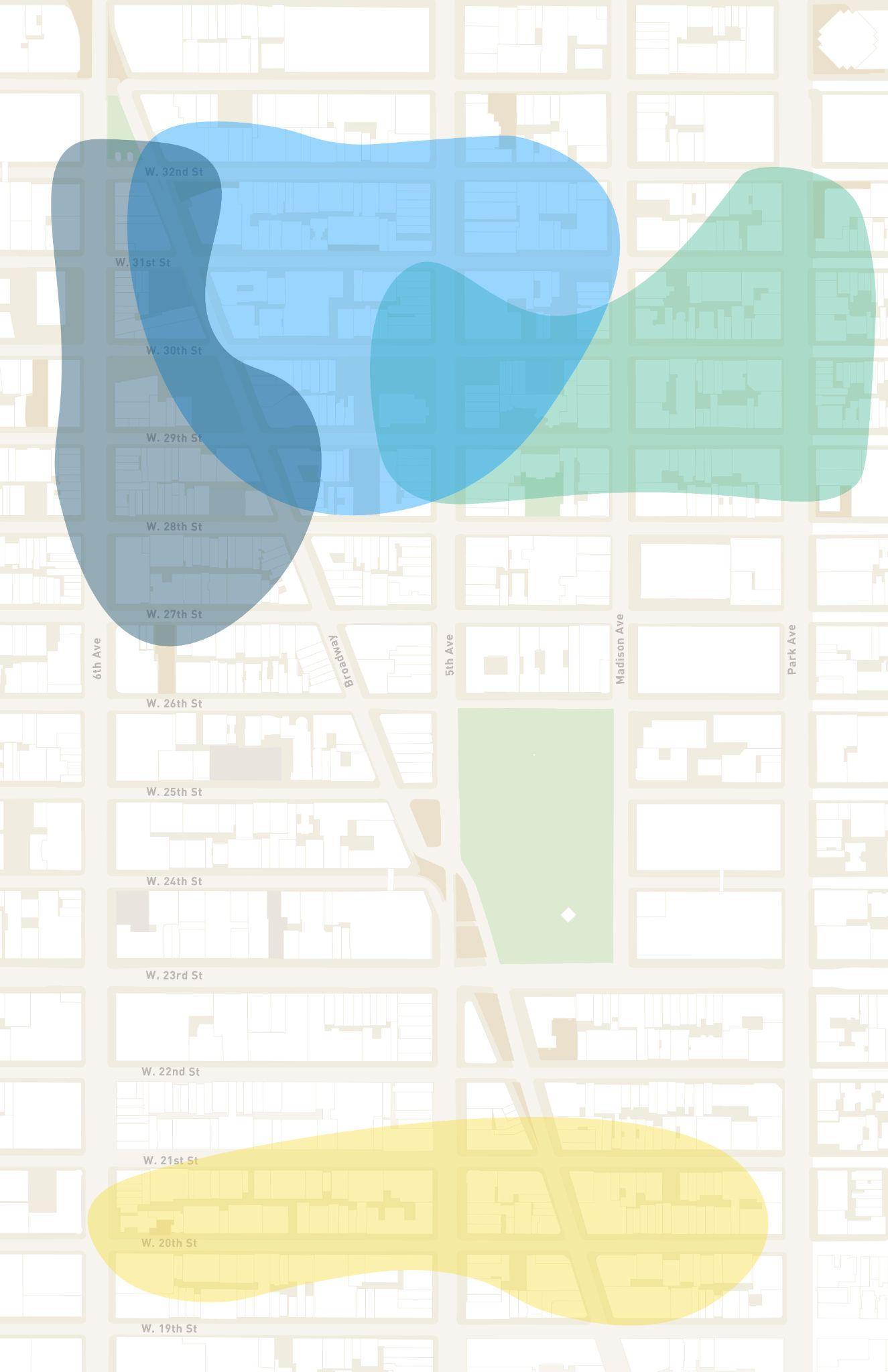

From our public life study and background research, we see a few character areas with unique users to focus on when implementing these strategies.
For example: improving creature comforts on Park Ave might be more focused on better crossings to help people get home and to work while on 5th Ave it might be more about orienting tourists.
Focus
Could we partner with the design stores in the district to design some seating?
A lot of people move through this district everyday. Make moving and staying throughout the district more comfortable—protect people from the elements (noise, smells, sun) and traffic. Ensure that people feel safe and comfortable commuting through the expansion area at all times and feel invited to stay and spend time.


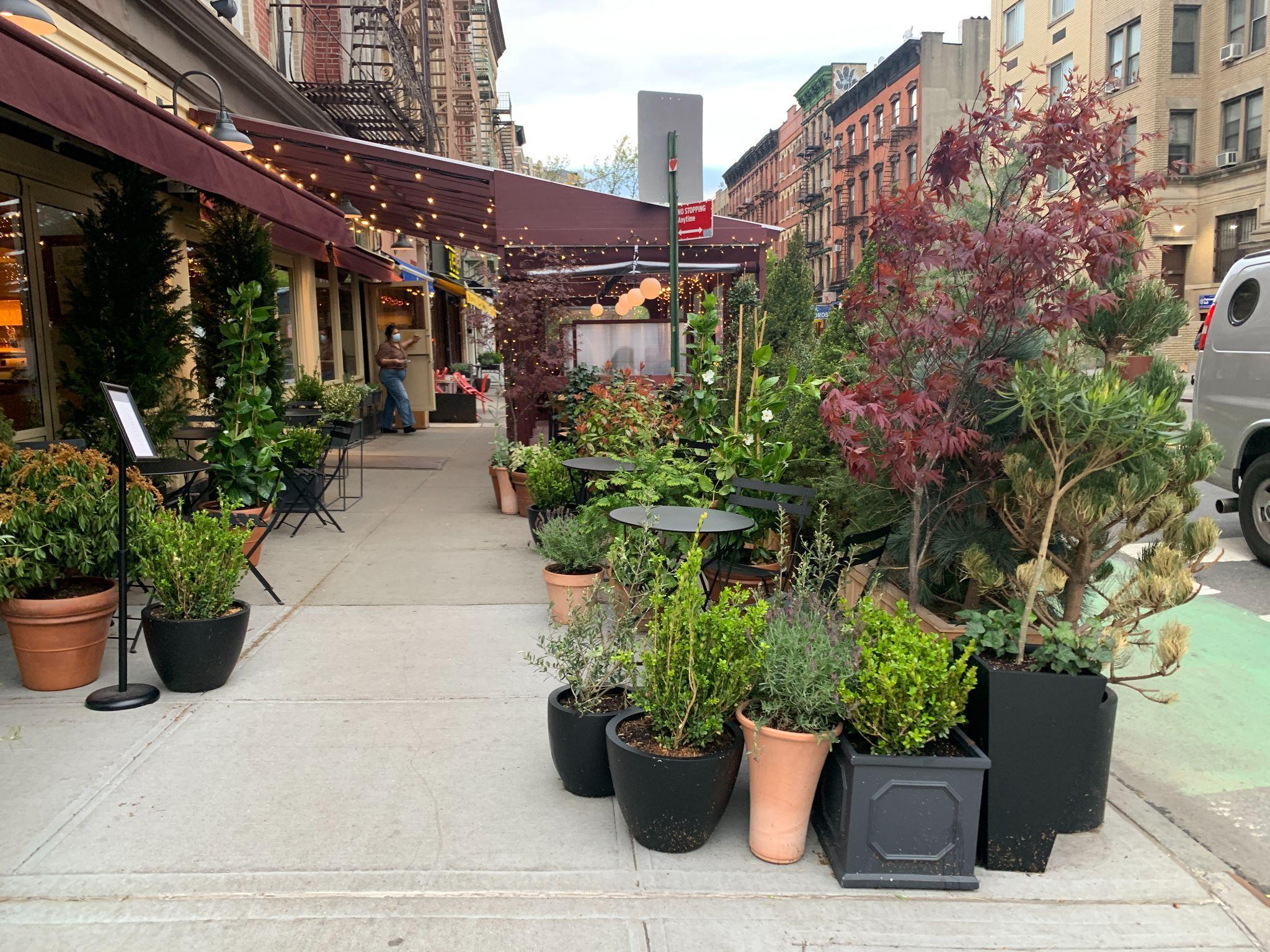
1. Increase public seating.
2. Install curb extensions at busy intersections.
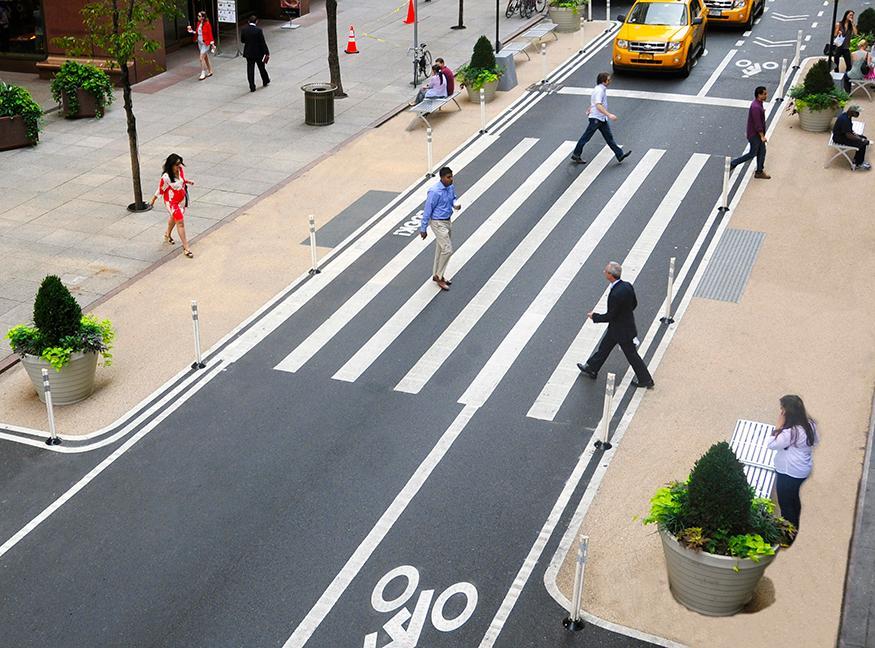
3. Increase street lighting and encourage open businesses to light the street after hours.

4. Introduce more greenery and shade.

Construction and continual growth is part of the district — don’t treat it as temporary. Celebrate this district as an area that is constantly improving itself with simple improvements to construction sites.
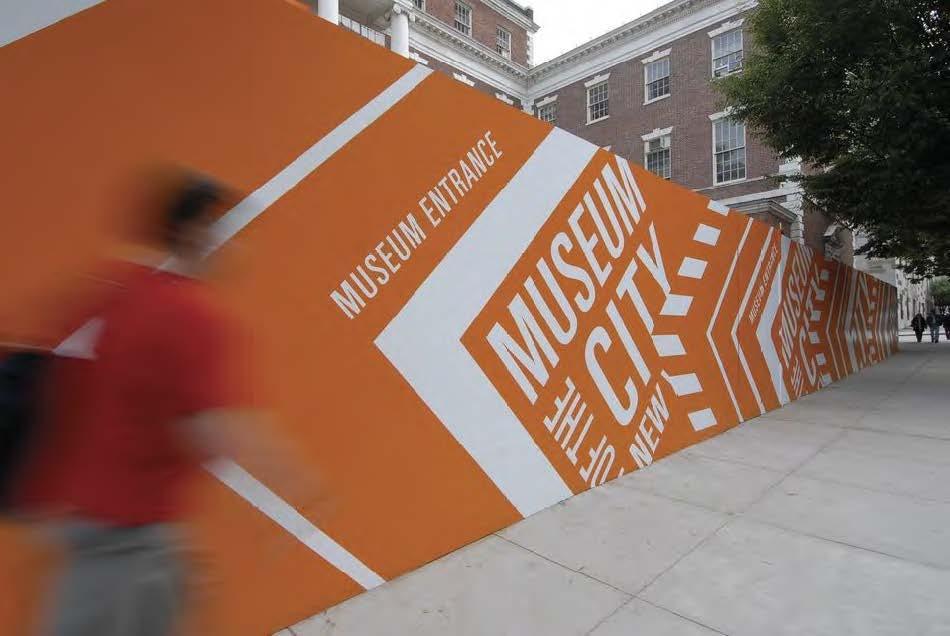
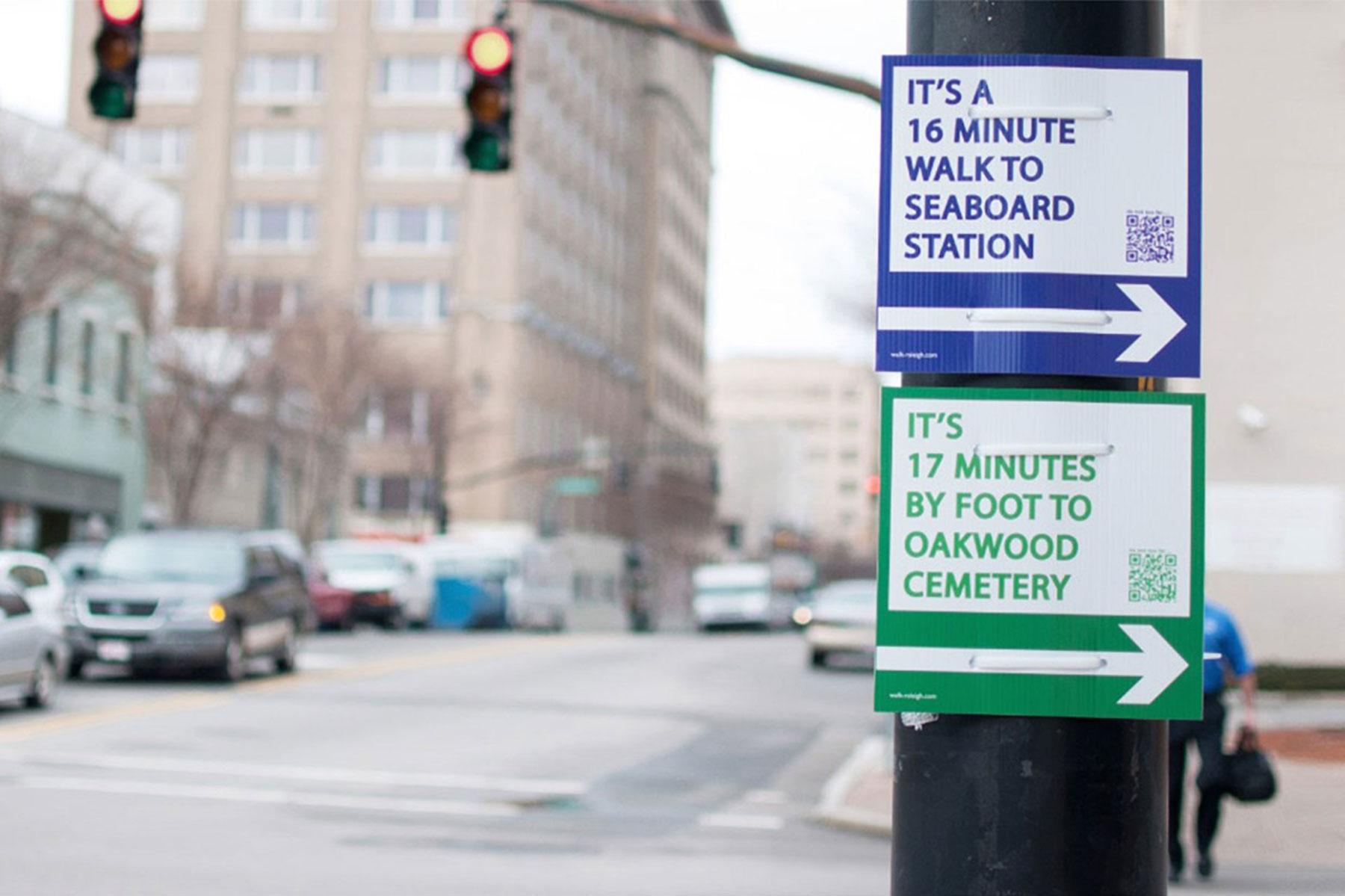
1. Scaffolding is already a lifeline for shade and seating. Formalize it with add-on lean bars and seating.
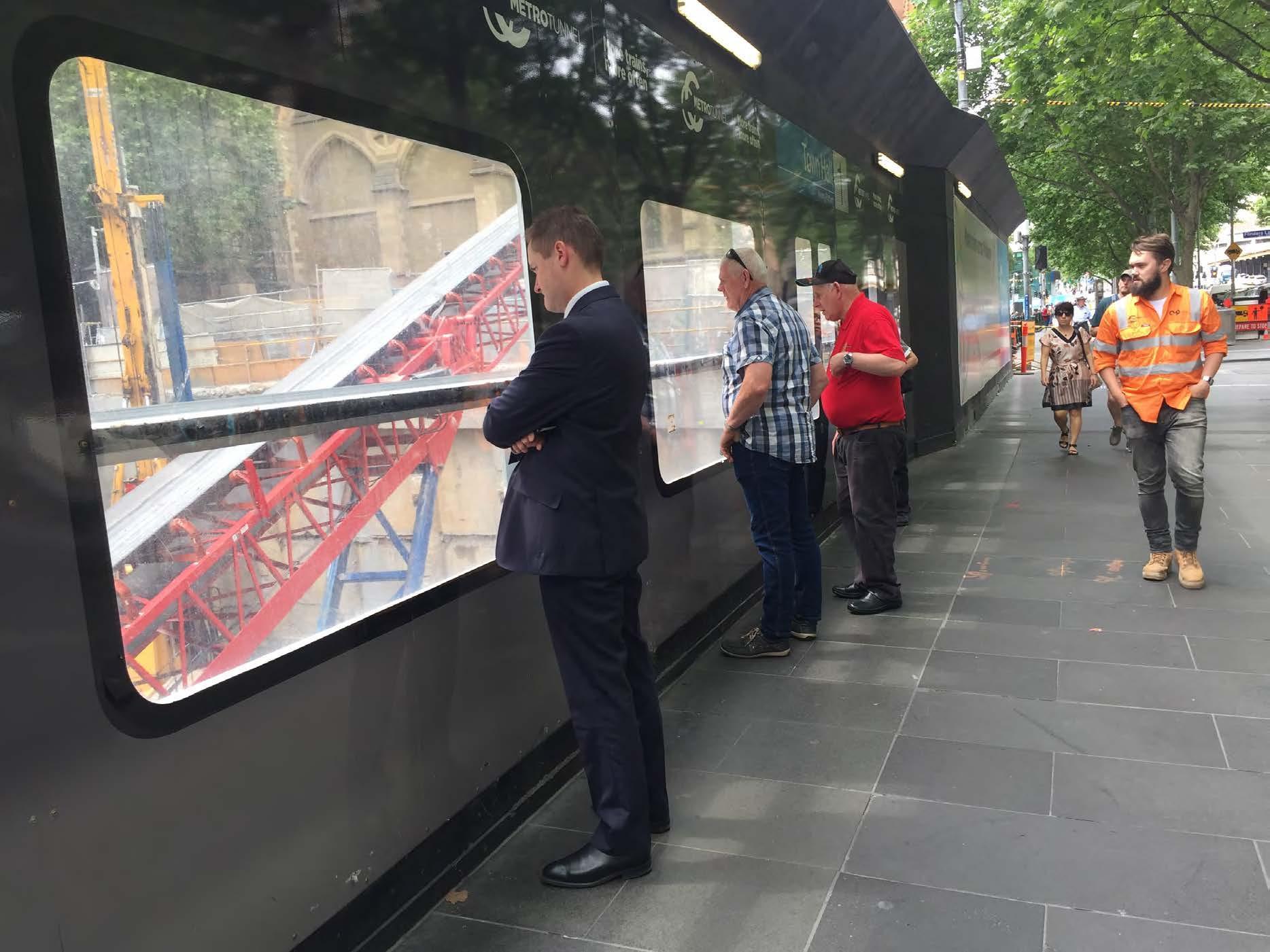
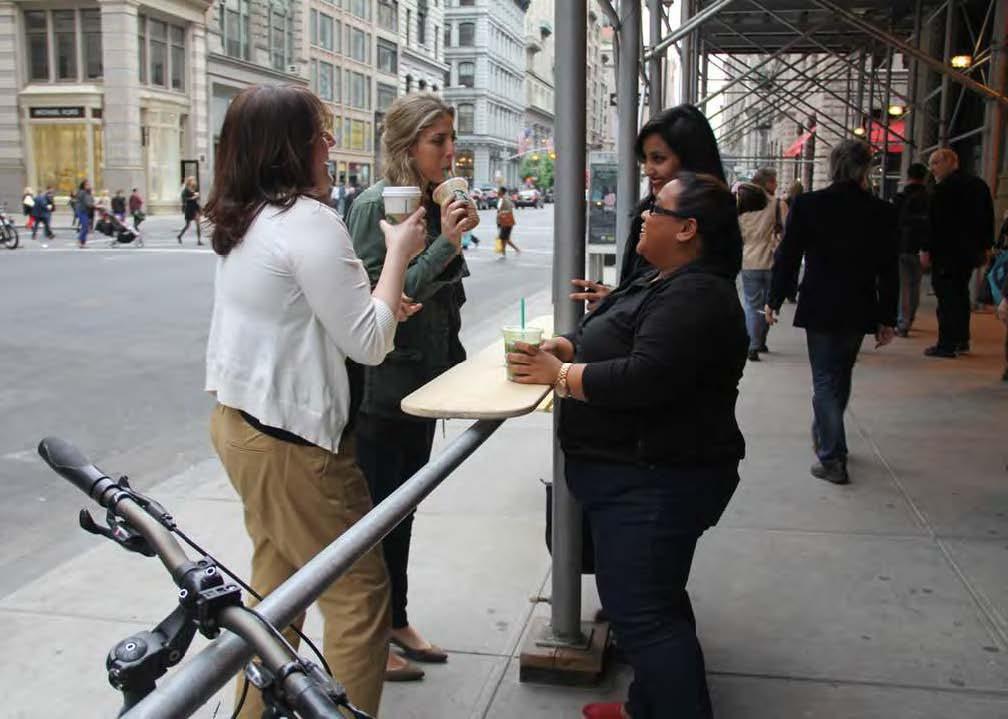
2. Give people construction visibility.
3. Enhance scaffolding with graphic wayfinding..Use destination based wayfinding to encourage people to continue on foot or by bike

This strategy is district wide but key places to start include:
- 6th Ave between 26th & 31st streets
- Park Ave at 31st (crossing & plaza)
- Park Ave at 28th
- Broadway at 31st
- Broadway at 28th
- 23rd between Broadway & Madison
Add bulb-outs, more visible crossings and public seating
Create better pedestrian space and crossings at
Better pedestrian space and crossings at Subway entrances
Add lighting & public seating
Add bulb-outs and more visible crossings
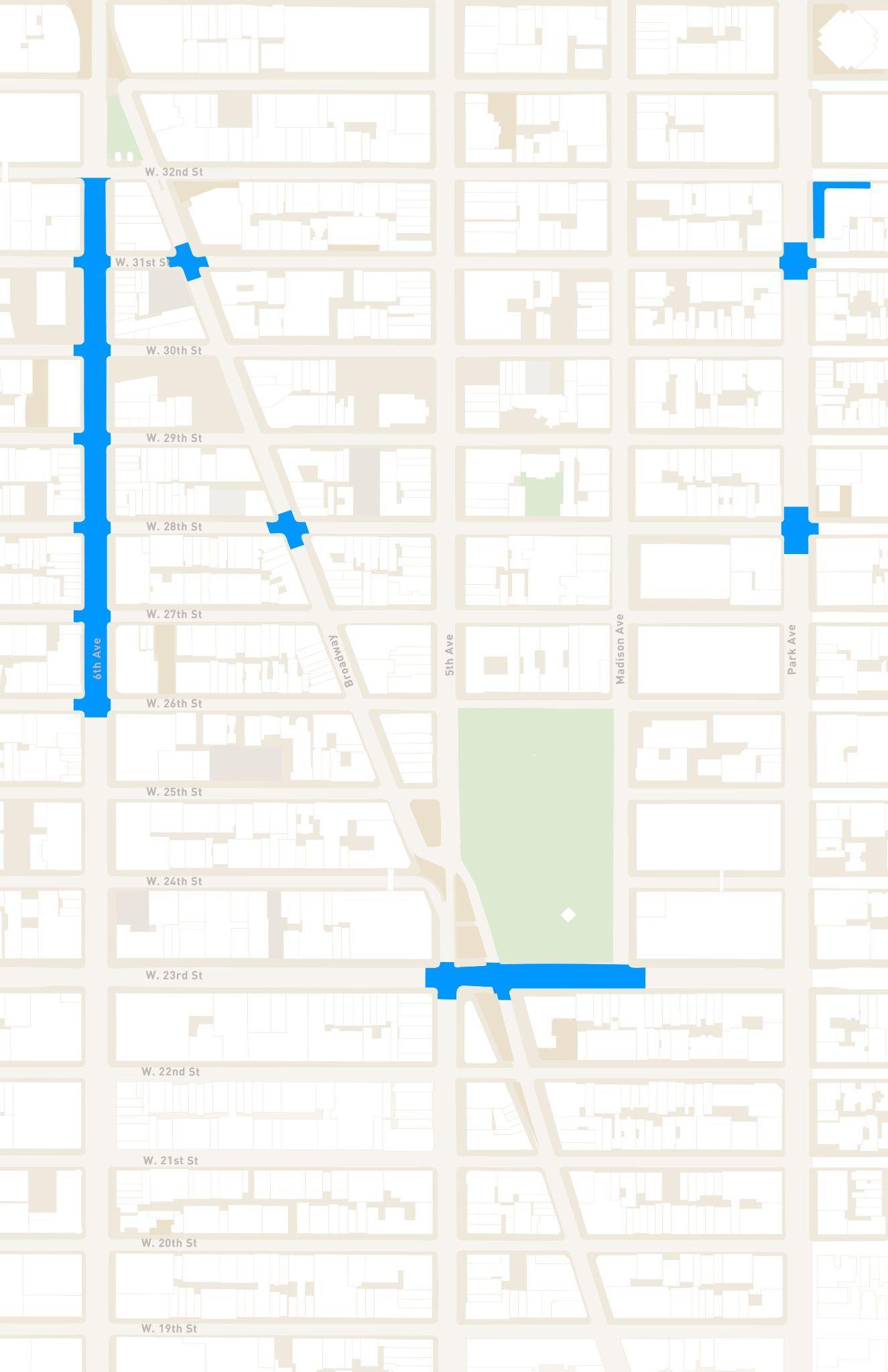
Turn informal gathering spot into a mini plaza


We observed many people fighting against car traffic. Improving creature comforts is about prioritizing the human experience over the vehicular one.

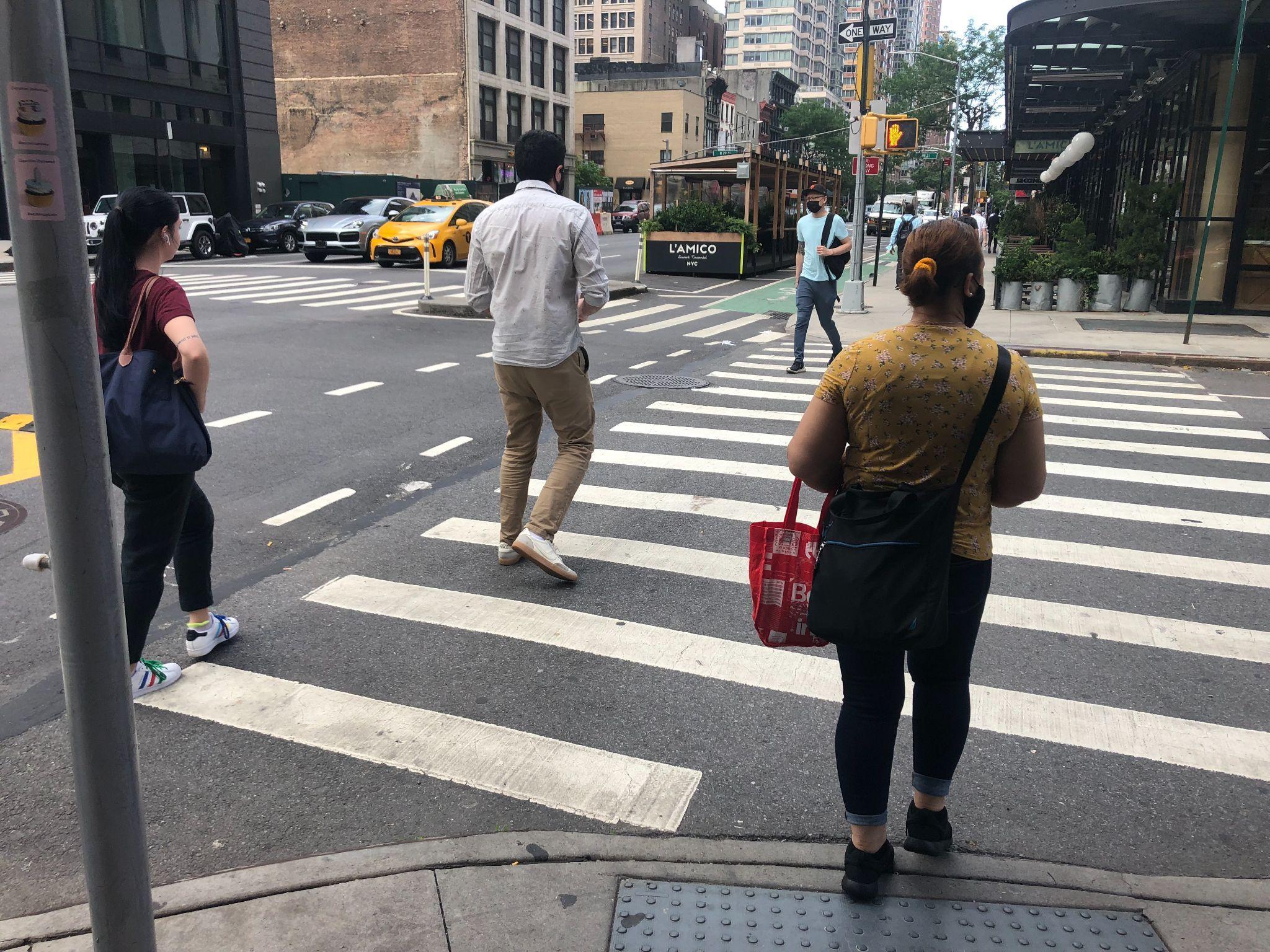

Broadway is already acting as an open street, people want to spend time here. Formalize the offer beyond outdoor dining with programmatic invitations to make the case for further pedestrianization.
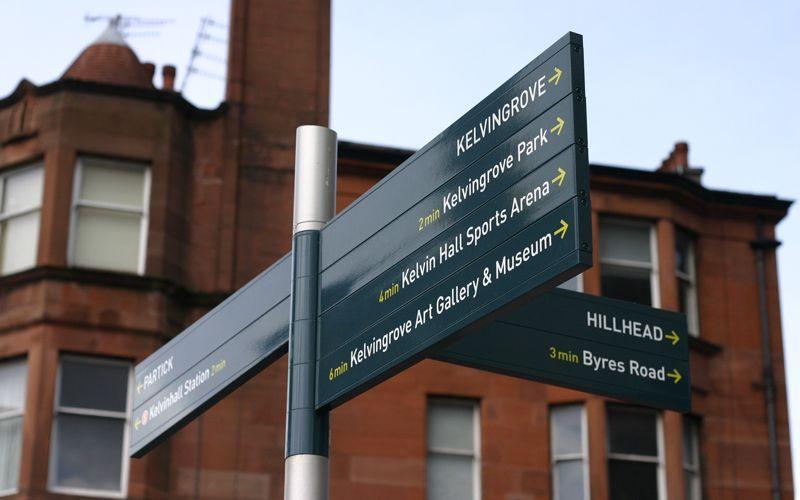
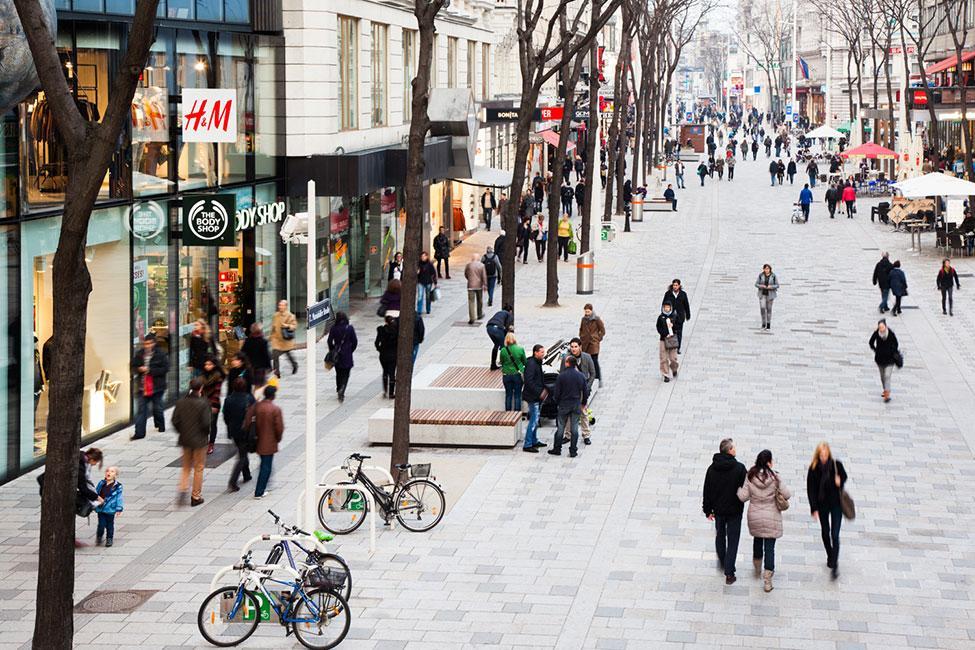

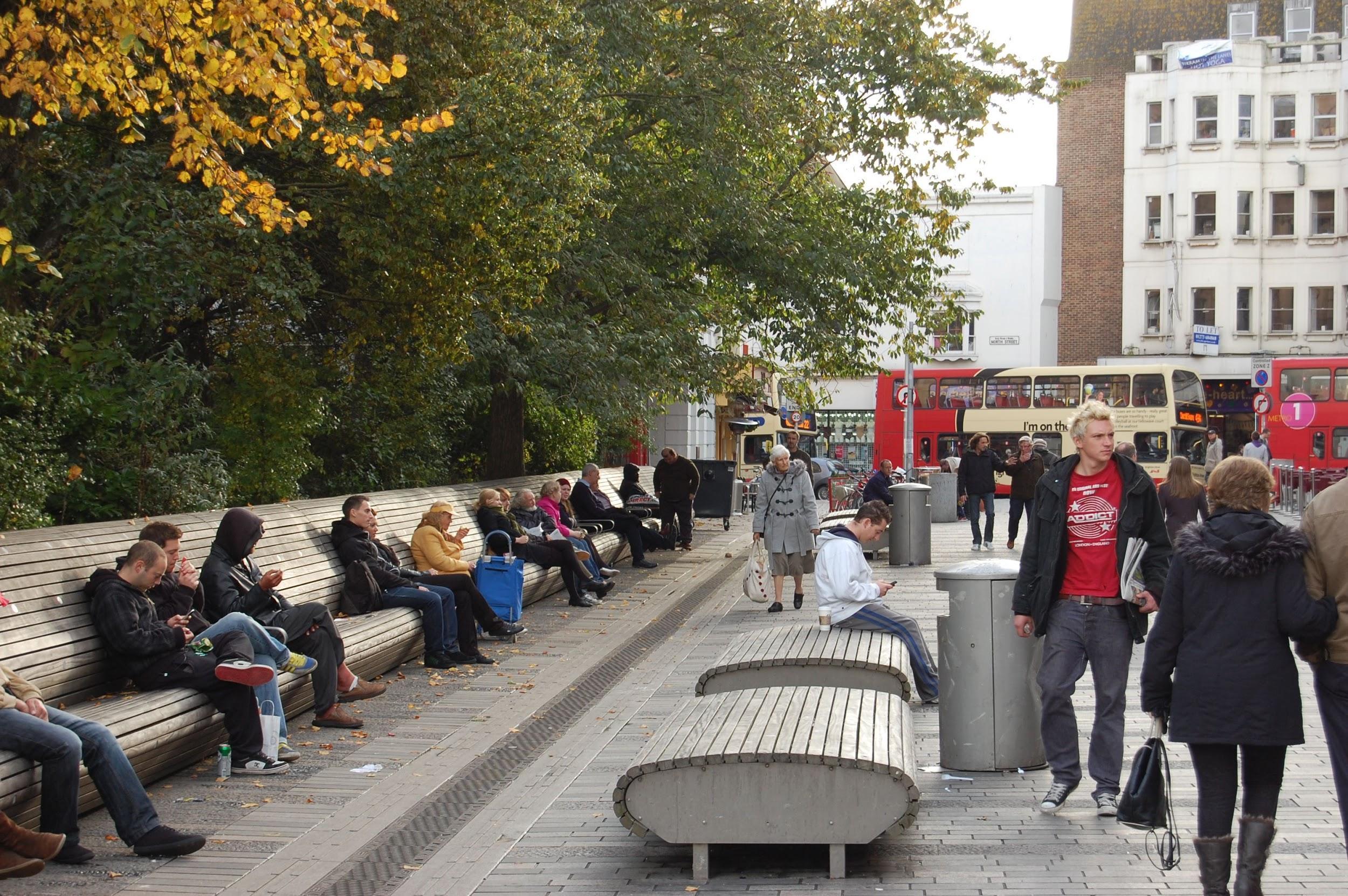 1. Short-term: Use paint to encourage and formalize the use of the street as pedestrian thoroughfare.
2. Short-term: Work with DOT for more block closures.
3. Increase public seating.
4. Enhance people space at transit stops on 28th and 23rd.
5. Improve wayfinding to other parts of district and NYC.
1. Short-term: Use paint to encourage and formalize the use of the street as pedestrian thoroughfare.
2. Short-term: Work with DOT for more block closures.
3. Increase public seating.
4. Enhance people space at transit stops on 28th and 23rd.
5. Improve wayfinding to other parts of district and NYC.
Formalize median seating with simple benches
Signal the Gateway to the district with a quality, colorful crossing at 31st
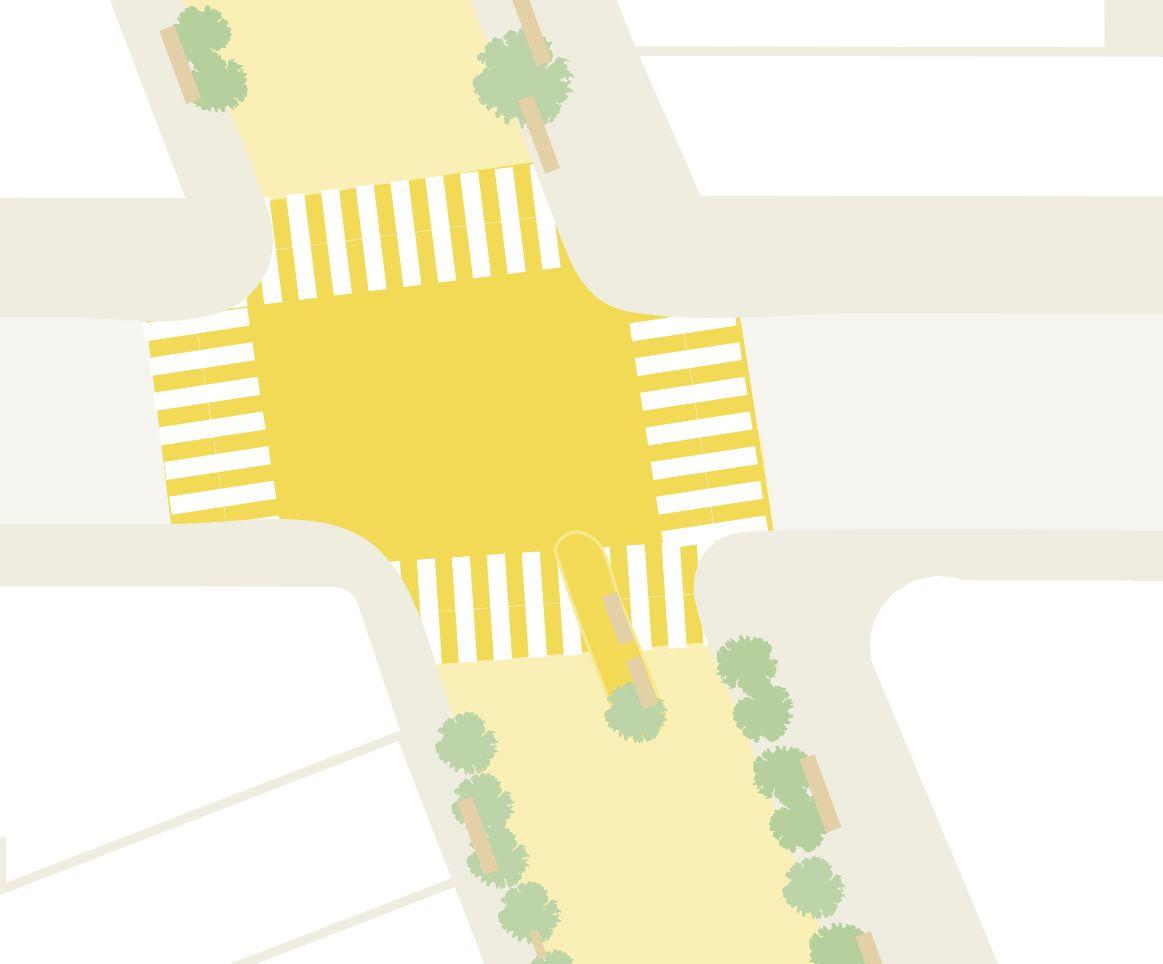

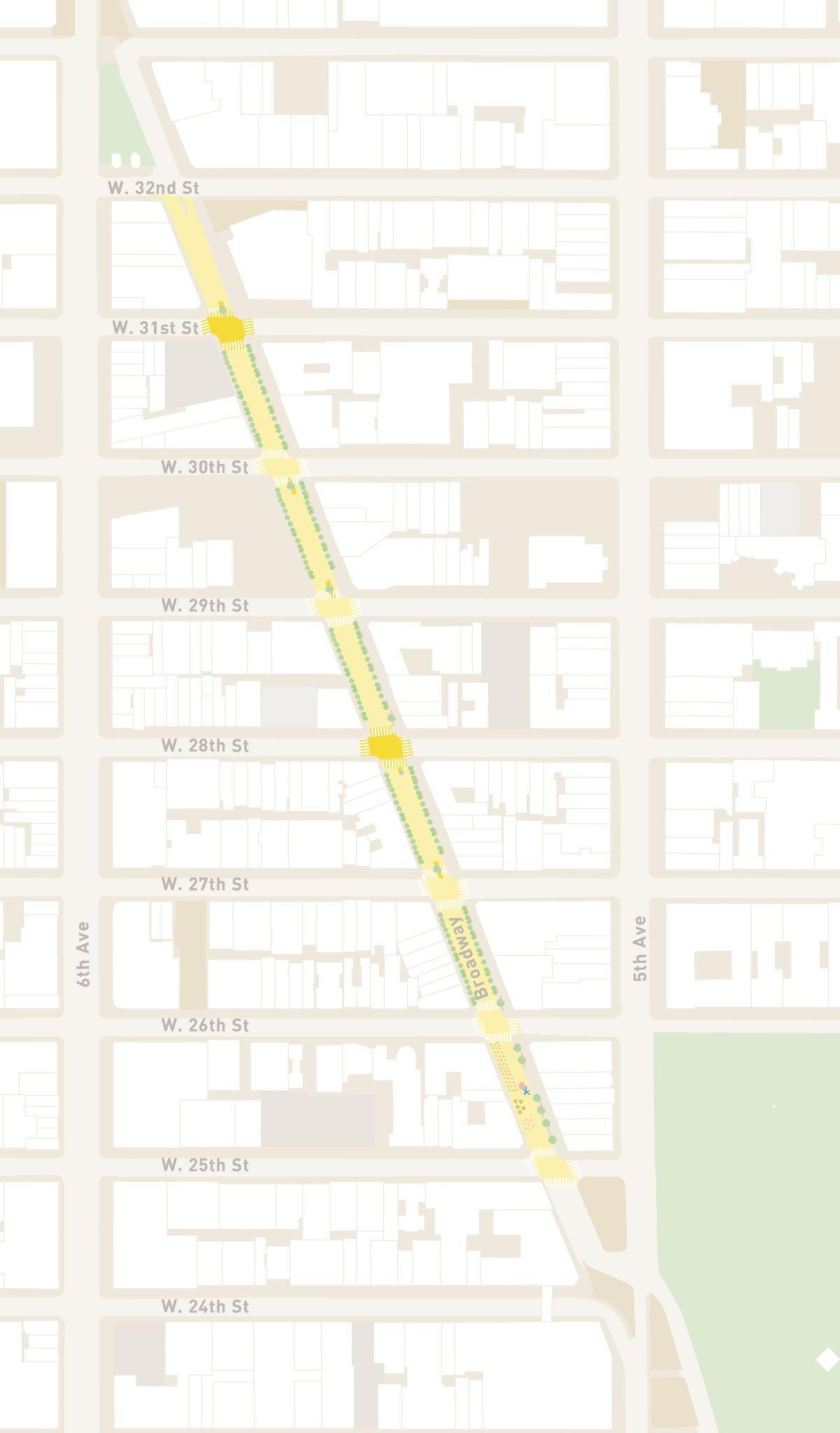
Add greenery and seating
Celebrate what’s already working and add on to Broadway’s success by providing more pedestrian space at gateways and subway entrances, seating and greenery, and extra invitations on existing street closures. Focus areas include:
- Crossing at 31st
- Crossing at 28th
- Medians between 31st-28th

- Outdoor dining block between 26th-25th
More ped space at subway entrances
Celebrate wins & add-onto outdoor dining with public seating & play opportunities
Small businesses maintain the fine-grain urban quality and bring some of old New York character to the expansion area. Support the foot traffic these businesses generate with more walking space to relieve any pinch points.

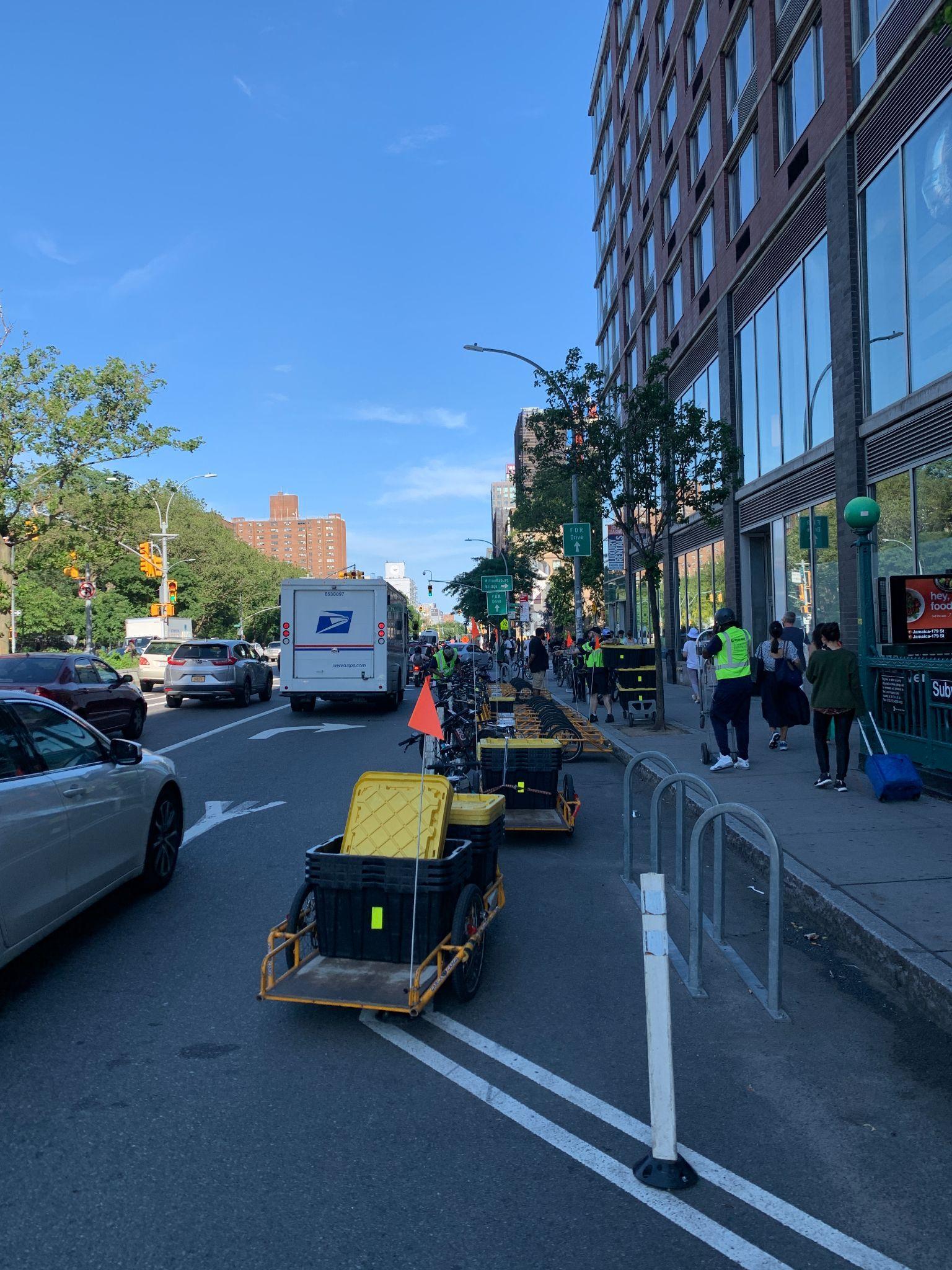
1. Work with DOTs Cargo bike program to implement a Cargo bike corral.

2. Add temporary micro ramps to ease loading.

3. Formalize the loading areas to protect cyclists.
4. Consider micro-grants for facade improvements.
Also helps cyclists!
Focus on the small businesses that give the neighborhood character. Make loading logistically easier for them and help eliminate crowding by keeping sidewalks clutter & loading mayhem. Focus areas include:
- 6th Ave between 31st-28th
-
-
-
-

Broadway Between 31st-28th
23rd Street
Madison at 28th Street
Park Avenue at 31st and 28th


Flatiron is a commuting hotspot & leading the way with new mobility in New York. Be innovative in providing for New Yorkers on wheels.
1. Celebrate cycling in New York with extra, everyday bicycling comforts.
2. Provide e-bike charging areas.


3. Consider public parklets or mobility hubs to double as waiting zones with bike parking for delivery workers and everyday cyclists.


4. Introduce bike micro-ramps.
5. Work with business owners making deliveries by bike, or interested in making this switch.
6. Work with delivery union/biz that have a lot of delivery to understand their needs.

Improve the experience of getting around on wheels for all New Yorkers and consider going above and beyond for cargo and delivery cyclists. Potential micromobility hub locations include:
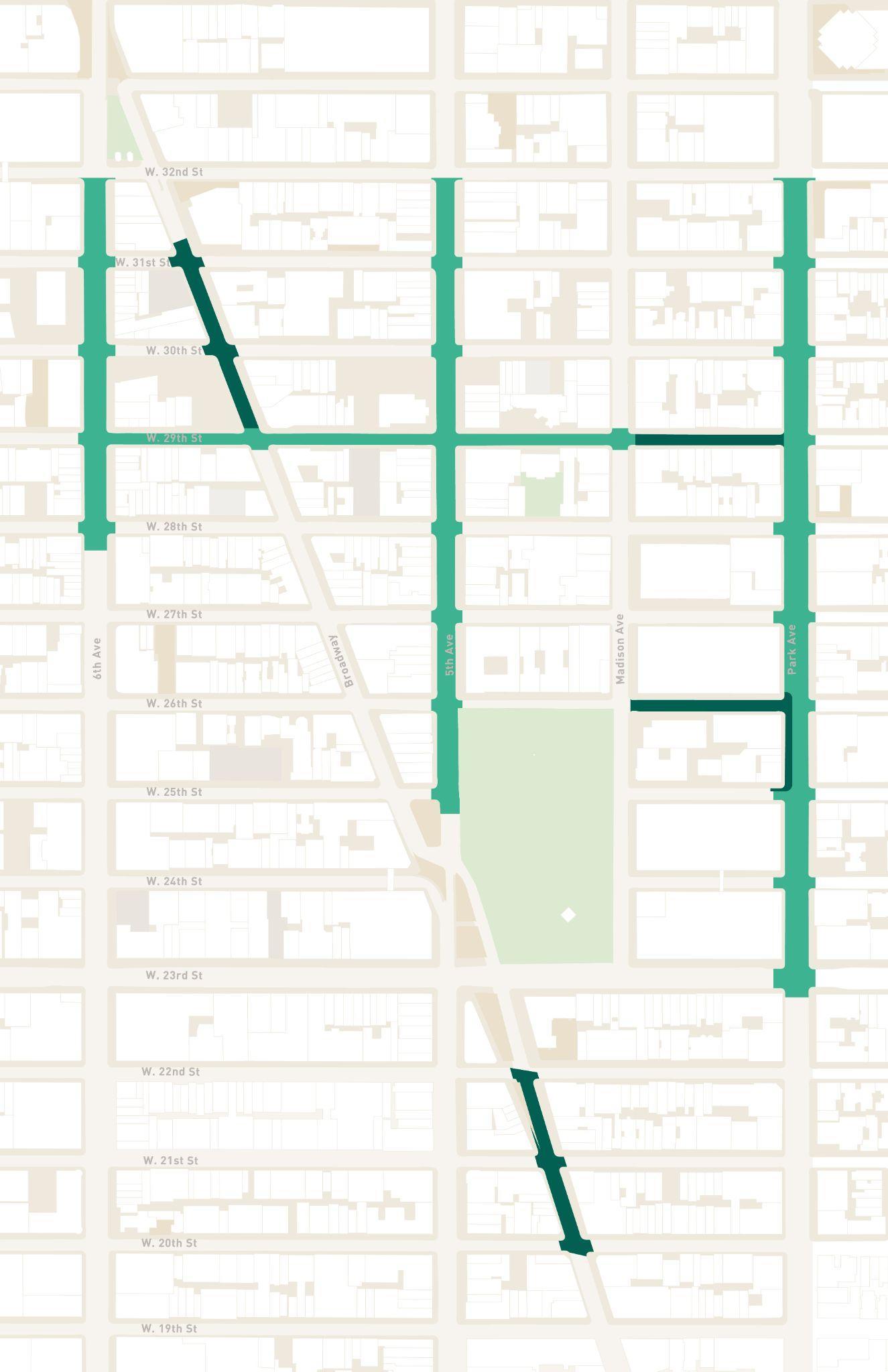
- 29th Street between Madison & Park
- Broadway between 31st and 29th
- Park Ave and 26th
- Broadway between 22nd and 20th
A true mix of tourists, workers, residents, and local tourists — the expansion area should offer something for everyone, at all times. Use programming to start putting the area on people’s mental map as a weekend and nighttime destination. Consider a variety of tenant types and operating hours moving forward.
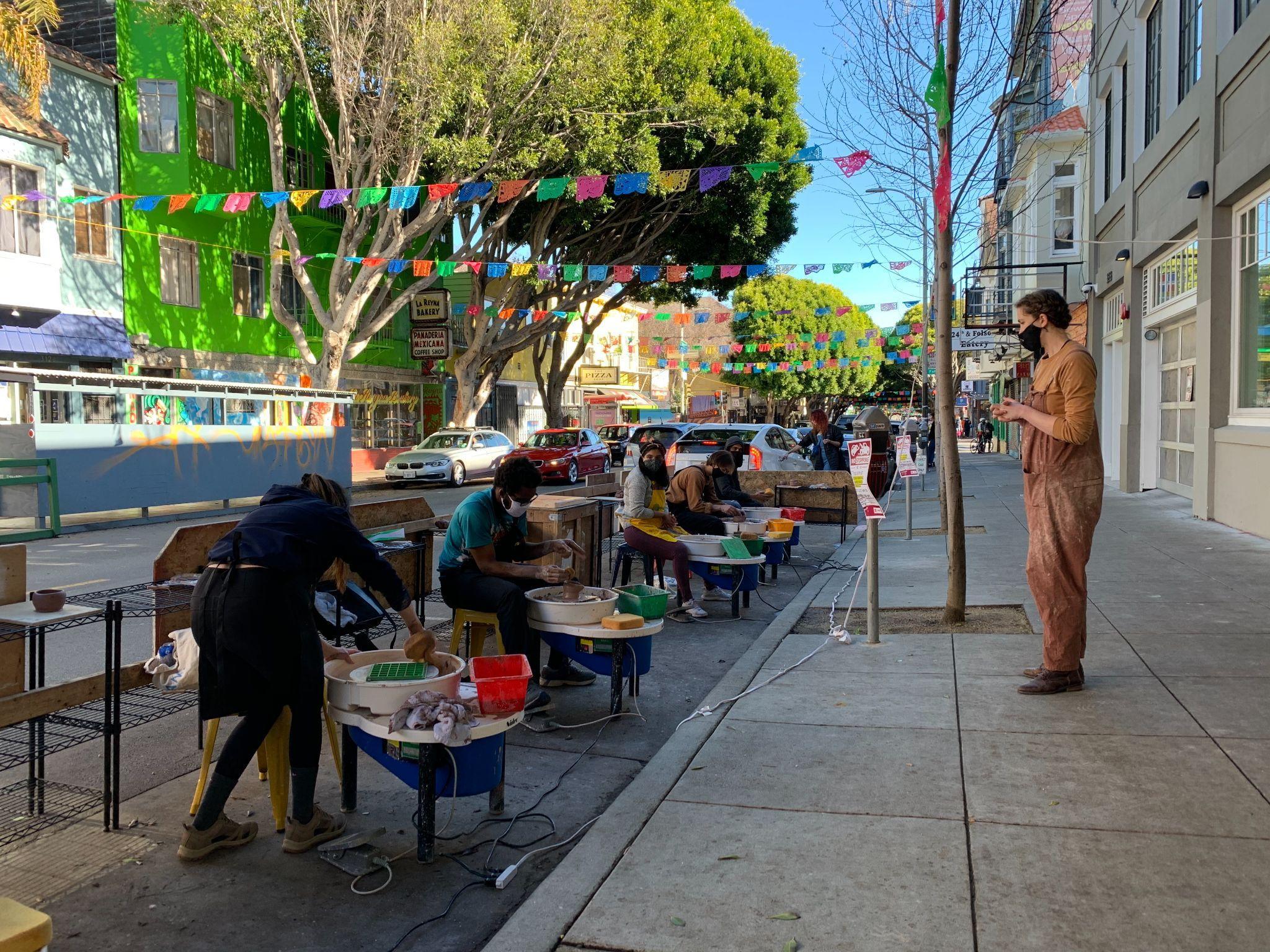
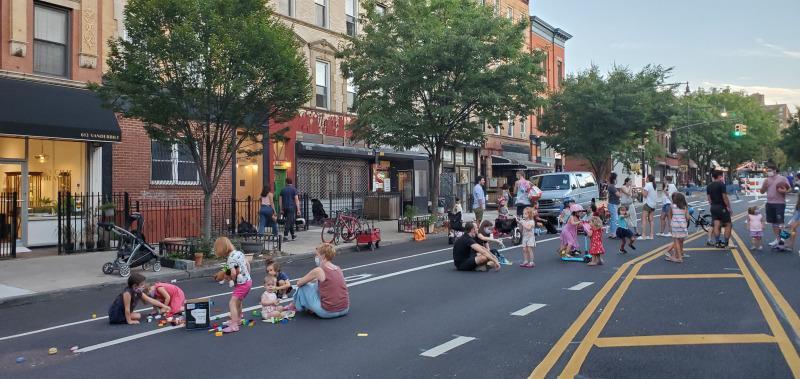
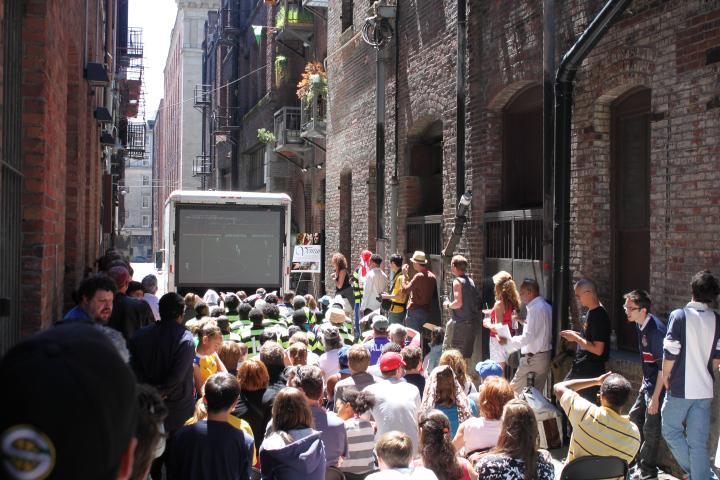


Many construction workers might not take a formal seat but will rest when informal & leaning options are provided
Flatiron is home to many different kinds of workers. From office commuters to construction workers to laptop-in-the-park people, consider how these users are being accommodated.

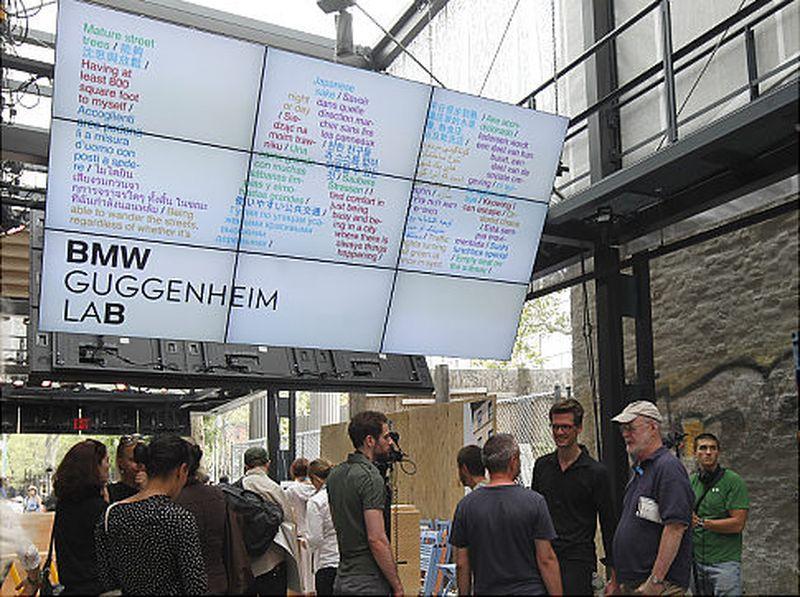
1. Keep informal seating in mind.
2. Consider other amenities like charging stations, lean comfort, and handwashing stations & affordable, quick food


3. Acknowledge Flatiron as a business and learning district with a rotating calendar of knowledge sharing & skill building.
4. Bring back the outdoor work spaces.



It’s important to distinguish Pilots from Creative or ‘Tactical’ Urbanism

Pilots are guided by strategy.
Low hanging fruit or a genuine test?

1/ Inform Long term change
2/ Actively engage and invite people to vote with their feet

3/ Create something while we wait
4/ Help people imagine what’s possible
5/ Point us to what we didn’t imagine
REFINE
Study what’s working and what’s not working. Continually learn and improve.
Great public spaces are never finished. Take a measure-test-refine approach to pressure test ideas, engage people, get feedback, and constantly improve.
TEST




Pilot some recommendations to try things out, ask people to ‘vote with their feet’, and make the case for permanent change
MEASURE
Continue to measure public life and public space conditions with more specific goals/questions
Increase in people walking
Increase in people using wheels
Increase in % of female cyclists
Increase in females spending time, especially at night
Public Life Survey
Public Life Survey
Public Life Survey
Public Life Survey
Increase in children and seniors spending time
Maintain the % of young adults spending time
Increase activity diversity
Boost overall public life on weekends and evenings
Decrease in people standing
Increase in people sitting on public seating
Increased reports of safety at night, especially by women
Public Life Survey
Public Life Survey
Public Life Survey
Public Life Survey
Public Life Survey
Public Life Survey
Intercept Surveys


1. Engage
a. Determine core stakeholder group, including DOT and other relevant city agencies

b. Present findings
2. Prioritize
a. Facilitate prioritization workshop with core stakeholders, identify what strategies and pilots to focus on, and where
3. Develop and Implement Pilots
4. Measure Impact
a. Conduct follow-up public life study to gather data on impacts of pilots or other interventions by the Partnership. Focus on gateways and nodes to understand the return of public life to the district in September
b. Additionally, locations of a fall 2021 or future public life study should correspond to focus or pilot areas identified in the strategies
● Continue the public life analysis by layering in additional data sets, collected by the Partnership, city agencies, and partners. This can help to identify more nuanced stories about how the district is used today by specific demographic groups, such as residents, and how patterns will change with the expansion and the 13 in-progress developments.
● Identify partners who can help bring the strategies to life. Begin sharing the findings and ideas with them and developing a cohort of partners that may be able to make this work actionable.

